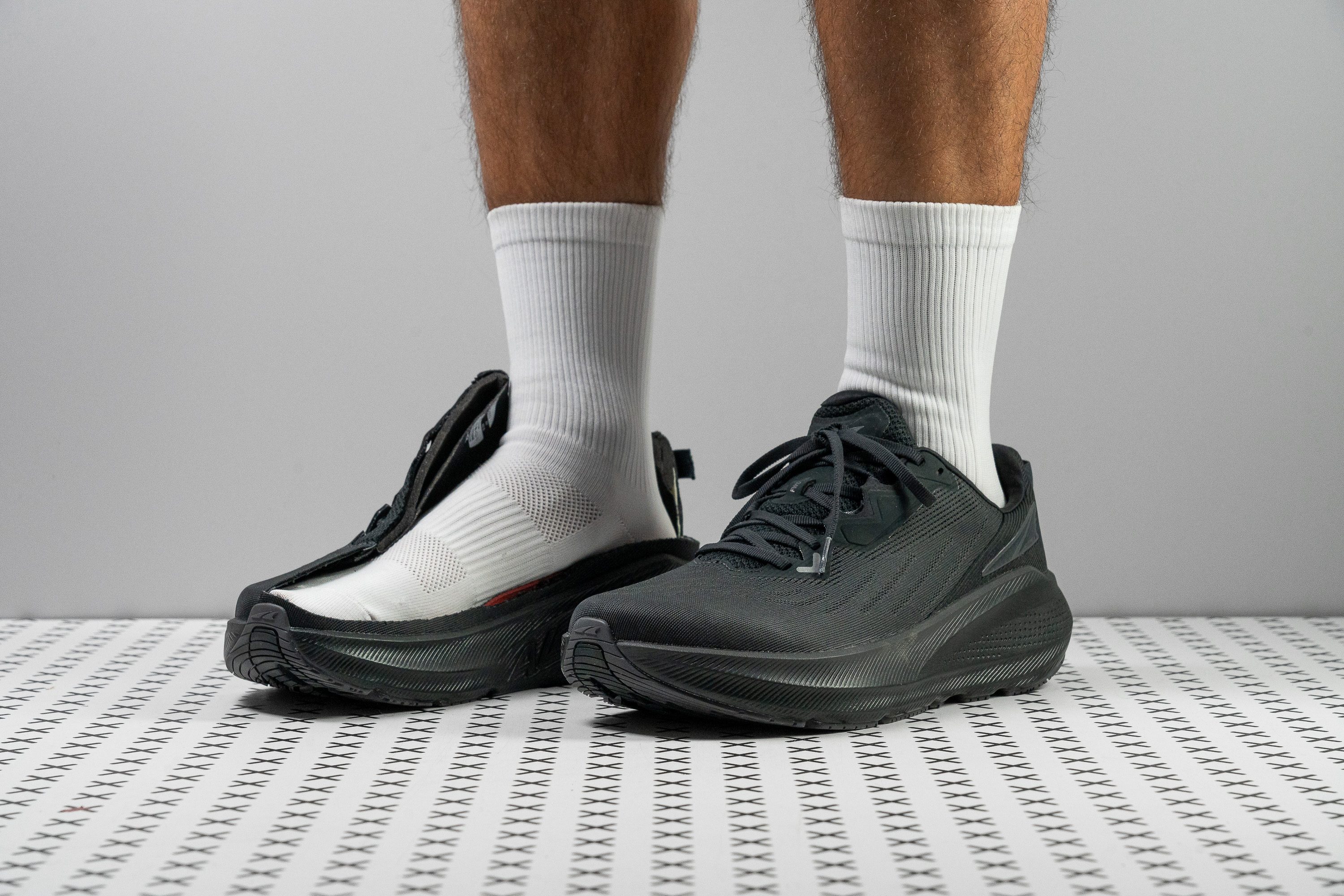Nuestra conclusión
Pros
- Parte delantera muy espaciosa
- Ligeras para el tamaño que tienen
- Tracción fiable
- Las Altra que mejor se adaptan a los talonadores (hasta ahora)
- Cómodas
- Lengüeta semi-reforzada
- Aterrizajes estables
Contras
- Retorno de energía que te deja con ganas de más
- La mediasuela se siente más rígida de lo esperado
- Podrían ser más duraderas
- El drop real es distinto del que dice la marca
Veredicto de los usuarios
Comparativa
Las zapatillas de running más parecidas
+ + Añadir unas zapatillas | |||||
|---|---|---|---|---|---|
| Puntuación global | 87 Notables | 90 Excelentes | 89 Notables | 87 Notables | |
| Precio | 170 € | 180 € | 130 € | 200 € | |
| Pace | Correr a diario | Correr a diario | Correr a diario | Correr a diario | |
| Absorción de impactos | Moderada | Alta | Moderada | Alta | |
| Retorno de energía | Bajo | Bajo | Moderado | Bajo | |
| Tracción | Alta | Moderada | Moderada | Alta | |
| Arch support | Neutral | Neutral | Neutral | Neutral | |
| Peso laboratorio Peso marca | 9 oz / 254g 9.5 oz / 269g | 9.7 oz / 275g 9.7 oz / 275g | 10.1 oz / 285g 9.8 oz / 277g | 9.8 oz / 278g 10 oz / 283g | |
| Drop laboratorio Drop marca | 6.5 mm 4.0 mm | 5.3 mm 5.0 mm | 7.0 mm 6.0 mm | 5.2 mm 8.0 mm | |
| Técnica de carrera | Medio/antepié | Medio/antepié | TalónMedio/antepié | Medio/antepié | |
| Talla | Tallan un poquito pequeño | Tallan bien | Tallan bien | - | |
| Rigidez de la mediasuela | Equilibrada | Equilibrada | Equilibrada | Blanda | |
| Diferencia de la rigidez de la mediasuela en frío | Normal | Normal | Normal | Pequeña | |
| Durabilidad de la parte delantera | Decente | Decente | Decente | Decente | |
| Durabilidad del acolchado del talón | Media | Alta | Media | Media | |
| Durabilidad de la suela exterior | Decente | Buena | Mala | Buena | |
| Transpirabilidad | Media | Media | Media | Media | |
| Anchura / ajuste | Ancha | Ancha | Media | Media | |
| Anchura de la parte delantera | Ancha | Ancha | Media | Media | |
| Flexibilidad | Moderada | Moderada | Moderada | Rígida | |
| Rigidez torsional | Rígidas | Rígidas | Moderadas | Rígidas | |
| Rigidez del contrafuerte del talón | Moderado | Rígido | Moderado | Rígido | |
| Rocker | ✓ | ✗ | ✓ | ✓ | |
| Talón laboratorio Talón marca | 35.9 mm 37.0 mm | 37.8 mm 38.0 mm | 36.8 mm 31.0 mm | 39.5 mm 43.5 mm | |
| Antepié laboratorio Antepié marca | 29.4 mm 33.0 mm | 32.5 mm 33.0 mm | 29.8 mm 25.0 mm | 34.3 mm 35.5 mm | |
| Anchuras disponibles | Estándar | EstándarAncho | Estándar | EstándarAnchoExtra Ancho | |
| Orthotic friendly | ✓ | ✓ | ✓ | ✓ | |
| Estación | Todas las estaciones | Todas las estaciones | Todas las estaciones | Todas las estaciones | |
| Removable insole | ✓ | ✓ | ✓ | ✓ | |
| Clasificación | #172 Top 45% | #41 Top 11% | #95 Top 25% | #153 Top 40% | |
| Popularidad | #128 Top 34% | #166 Top 44% | #234 38% inferior | #67 Top 18% |
Quién debería comprárselas
Las Altra FWD VIA deberían estar en tu lista de deseos si:
- Quieres una parte delantera muy espaciosa que te deje mover los dedos con naturalidad.
- Te gustaron los otros modelos de Altra pero quieres más espuma bajo los pies y prefieres evitar el drop cero.
- Necesitas un modelo de entrenamiento diario ligero para uso diario y salir a correr de vez en cuando, y quieres que tenga una parte delantera con forma de pie.
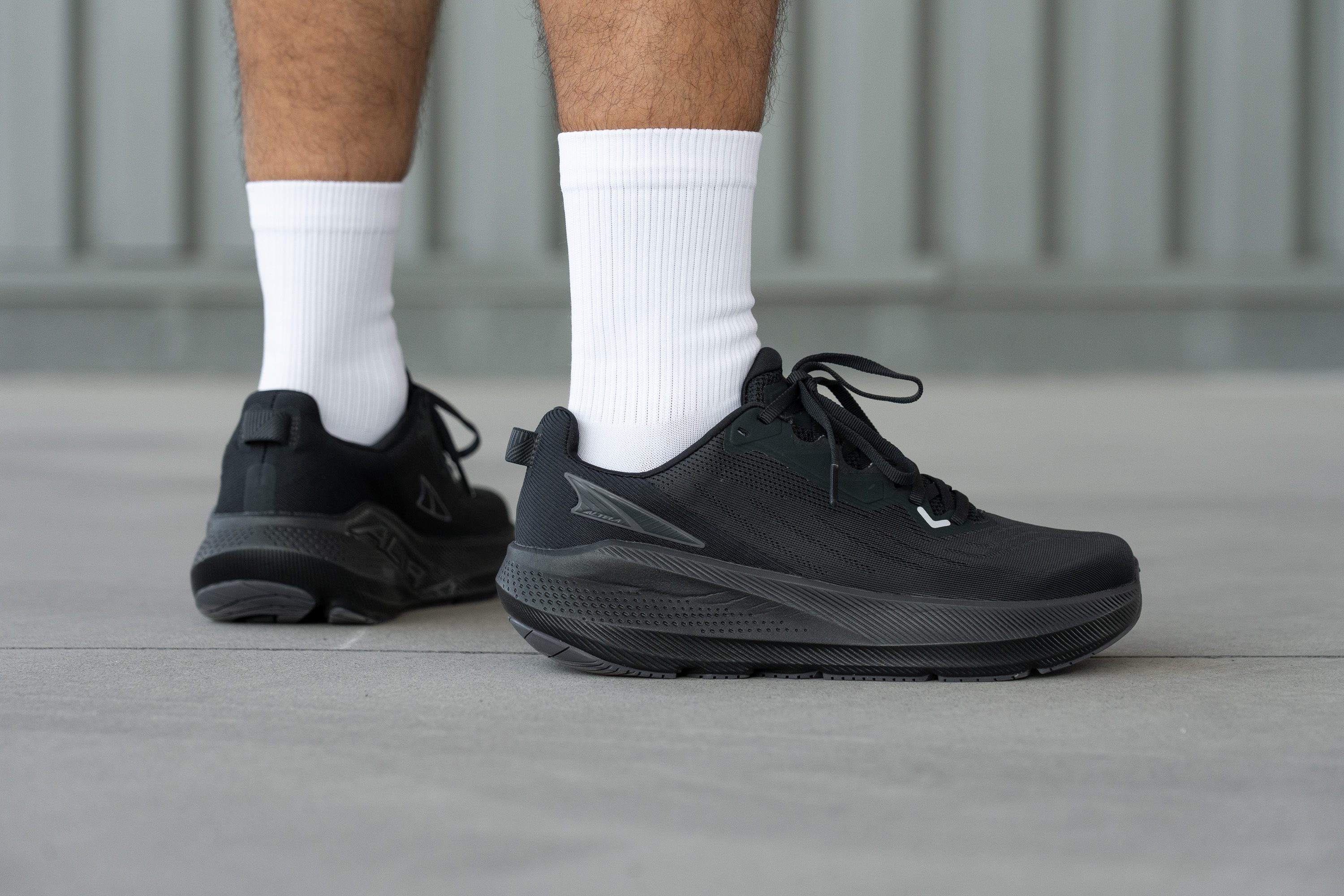
Quién NO debería comprárselas
Creemos que el mayor problema de las FWD VIA es su decepcionante retorno de energía. En nuestras pruebas de laboratorio, la espuma EVA supercrítica no solo era demasiado rígida, sino también muy aburrida; vamos, que está muy lejos de las mediasuelas vivas y reactivas que hemos visto en zapatillas como las ASICS Novablast 5 o las New Balance FuelCell Rebel v5 (ambas son más económicas y ofrecen una pisada mucho más enérgica).
Además, creemos que su drop no les va a llamar la atención a las personas que prefieren la sensación clásica de Altra: una mediasuela con una geometría más natural. En nuestra experiencia, las Altra Torin 8 son una opción mucho mejor para ese público, ya que mantiene el clásico drop cero y además ofrece un mejor retorno de energía.
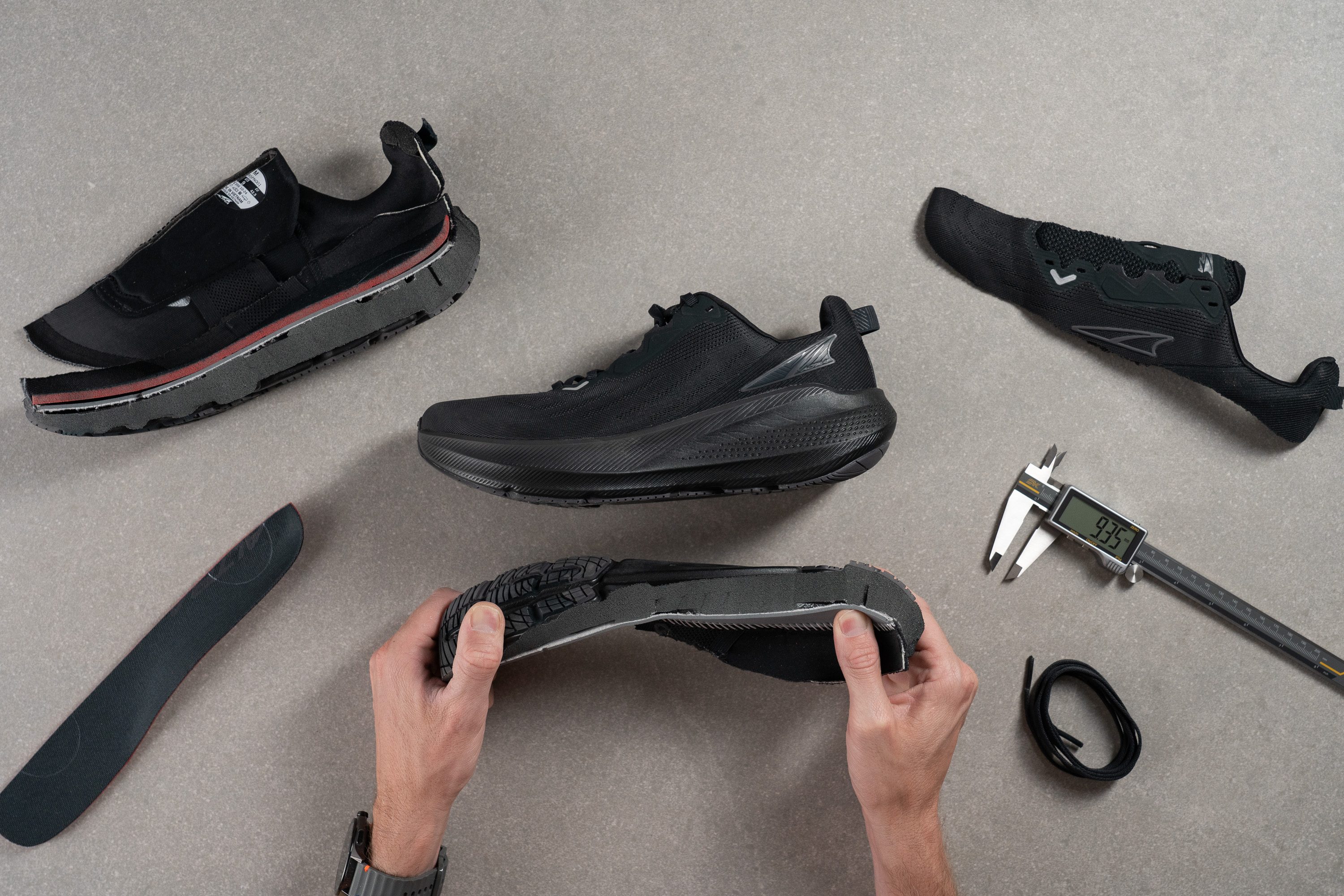
Amortiguación
Shock absorption
A pesar de ser unas de las Altra más altas que hemos analizado hasta la fecha, en nuestro laboratorio medimos una absorción de impactos bastante normalita. El talón obtuvo un resultado inferior a la media con sus 122 SA, mientras que el drop bajo ayudó a que el antepié alcanzase 113 SA.
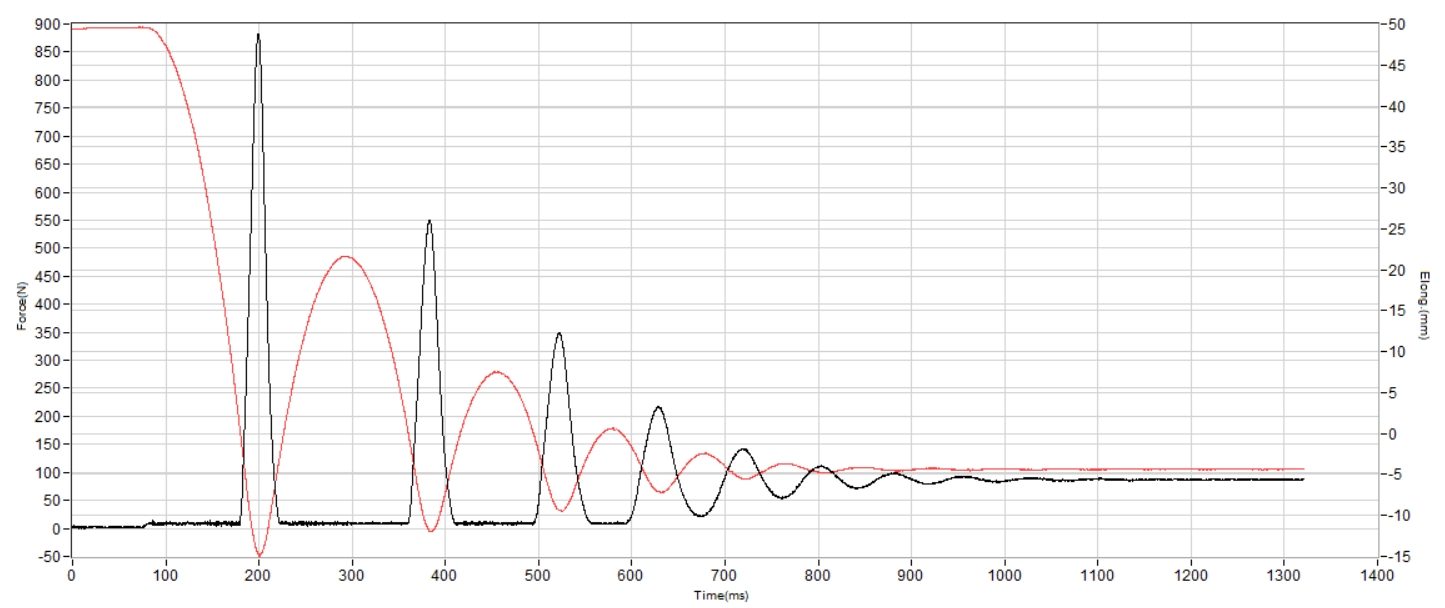
| FWD VIA | 122 SA |
| Media | 130 SA |
Energy return
Este es un ejemplo estupendo de por qué no te tienes que creer a pies juntillas la publicidad de las zapatillas de running. A ver, a nosotros nos gusta Altra, sobre todo por sus conocidas partes delanteras espaciosas, pero... en este caso, la marca está promocionando algo que, simplemente, no es real.
En la página oficial de las FWD VIA, la marca dice que estas zapatillas tienen la espuma Altra EGO™ FLO, que está inflada con nitrógeno, y que es ligera y está diseñada para ofrecerte una pisada reactiva y cómoda. Sin embargo, cuando la analizamos siguiendo el estándar ASTM F1976, descubrimos que el retorno de energía en el talón es de solo un 48,6 %, así que está muy por debajo de la media de las zapatillas de running y lejos de ofrecerte una pisada receptiva.
| FWD VIA | 48.6% |
| Media | 58.6% |
Altura de la suela en la zona del talón
Altra ha lanzado algunos modelos maximalistas como las Olympus 6 para trail running, pero con 35,9 mm, ya no podemos decir que las FWD VIA son un modelo de amortiguación máxima. ¡Así son los estándares actuales!
Creemos que estas zapatillas tienen una suela de altura estándar en el talón, y esa es la sensación que te puedes esperar si estás acostumbrado a los últimos modelos de otras marcas, como las Hoka Clifton 10.
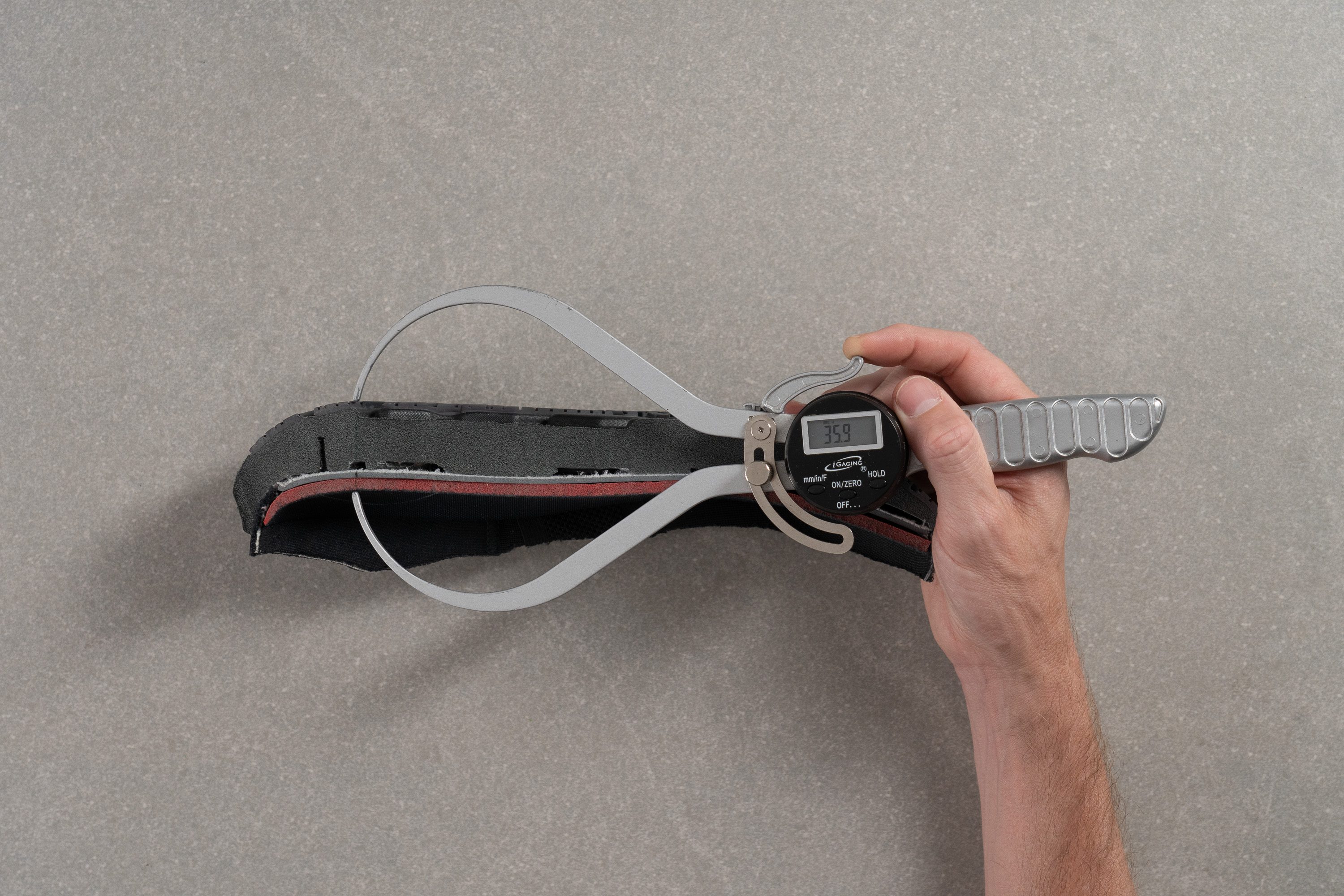
| FWD VIA | 35.9 mm |
| Media | 34.8 mm |
Altura de la suela en el antepié
Gracias al drop bajo de las FWD VIA, el antepié se siente como si tuviera más amortiguación de lo habitual. Cuando lo medimos, nuestro calibre marcó 29,4 mm en esta zona, lo que refuerza la filosofía de diseño habitual de Altra de crear zapatillas que fomenten el aterrizaje con el mediopié o los metatarsos al correr.
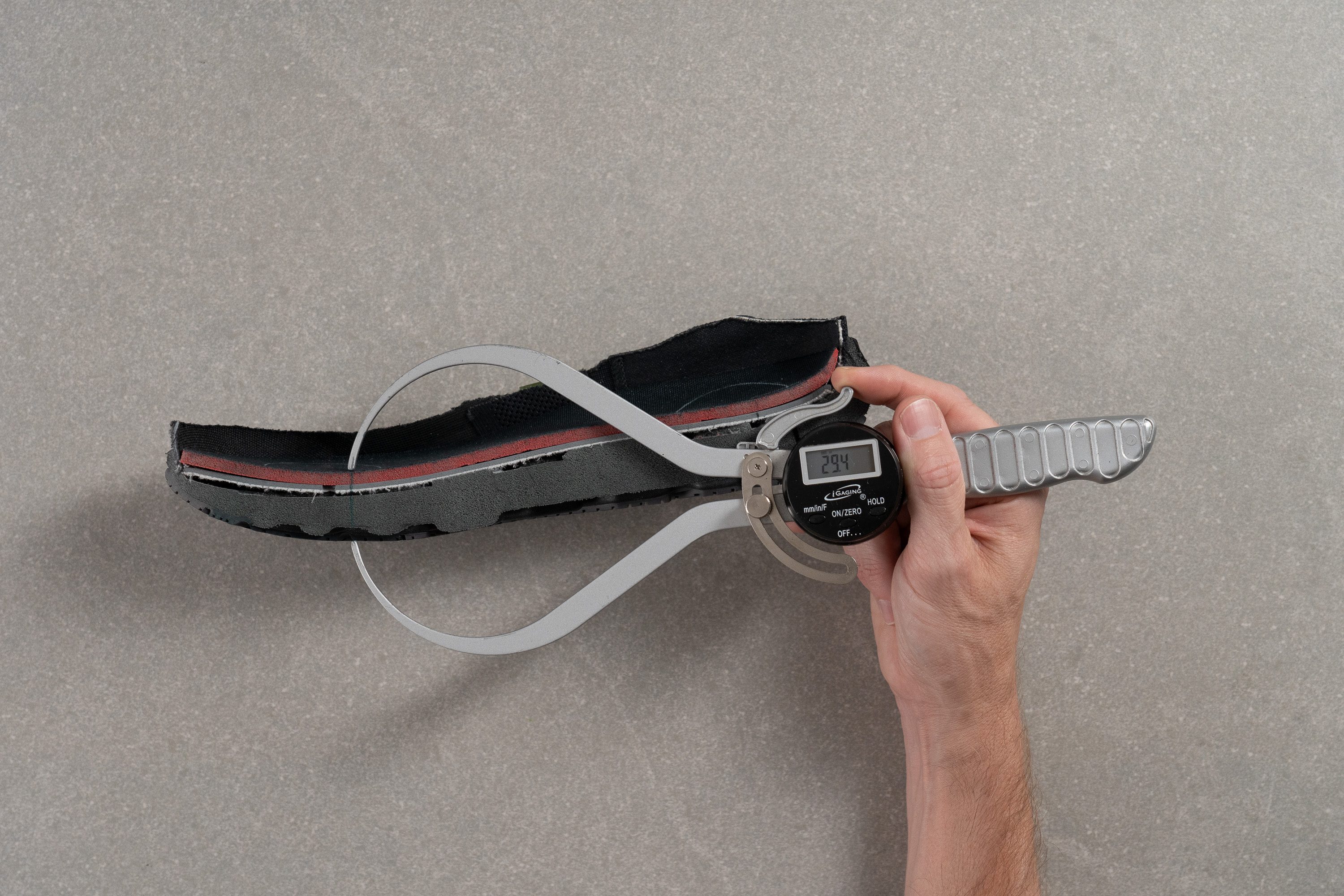
| FWD VIA | 29.4 mm |
| Media | 26.2 mm |
Drop
Que Altra se ha alejado de esa filosofía de drop cero exclusivo no es ningún secreto, y resulta que ahora ofrece muchos modelos con un drop de 4 mm, como las Altra Experience Form. Pues este también es uno de ellos, aunque cuando lo medimos en el laboratorio, nuestros cálculos nos dicen que su drop es de 6,5 mm, que es más de lo que nos esperábamos... y probablemente decepcione a los fans más fieles de Altra.
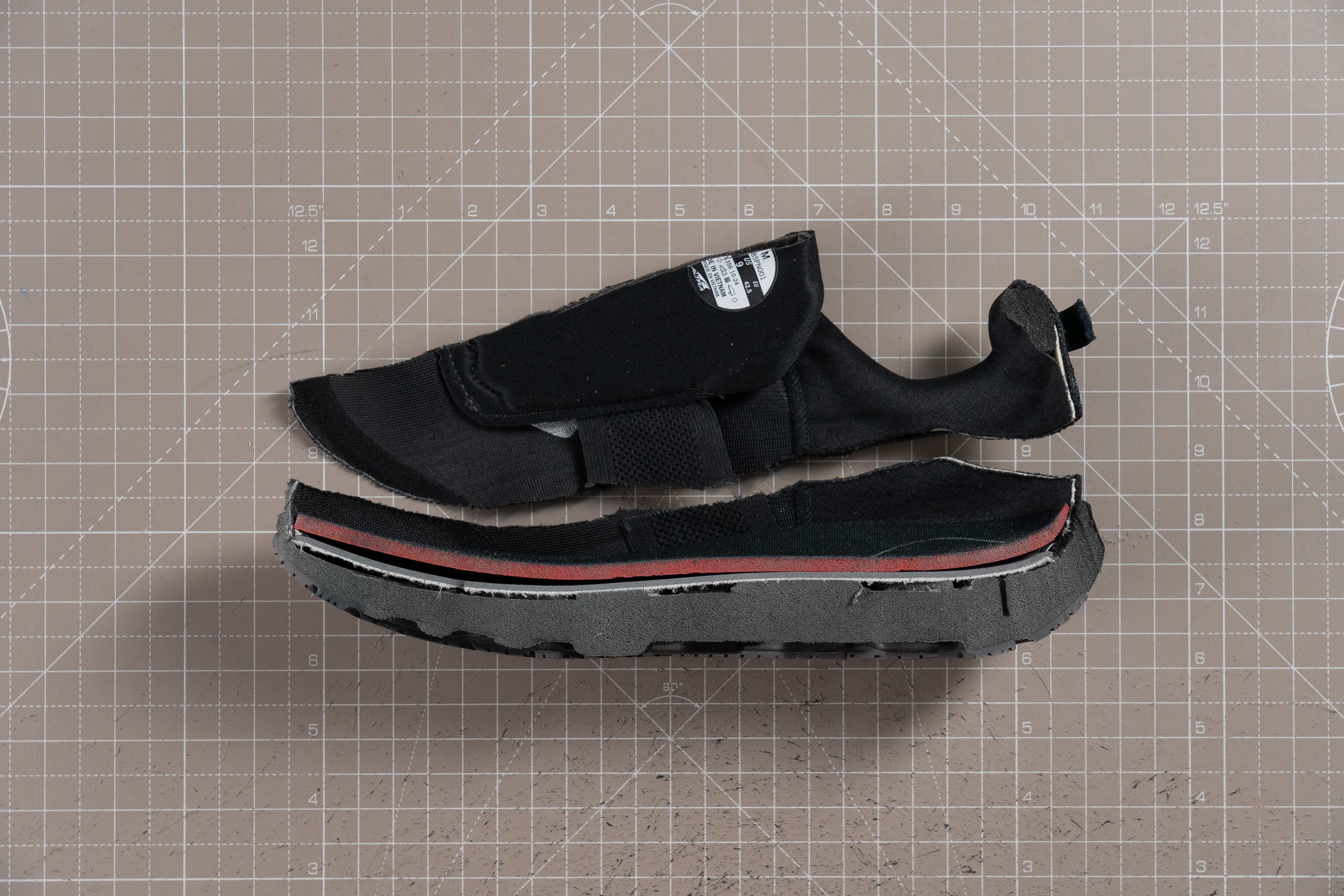
| FWD VIA | 6.5 mm |
| Media | 8.6 mm |
Midsole softness
To be honest, the EGO FLO foam turned out to be far from what we expected. This shoe was heavily promoted as plush and bouncy, but we found it to be neither. Energy return was clearly below expectations (as we tested earlier) and the foam’s feel leans more toward a firm-and-stable ride than a cloud-like one, registering 22.5 HA.
Runners who enjoy a firmer, more grounded sensation will appreciate it, of course. However, we think this shoe would benefit from a different underfoot character if Altra wants it to steal sales from shoes like the Nike Vomero 18.
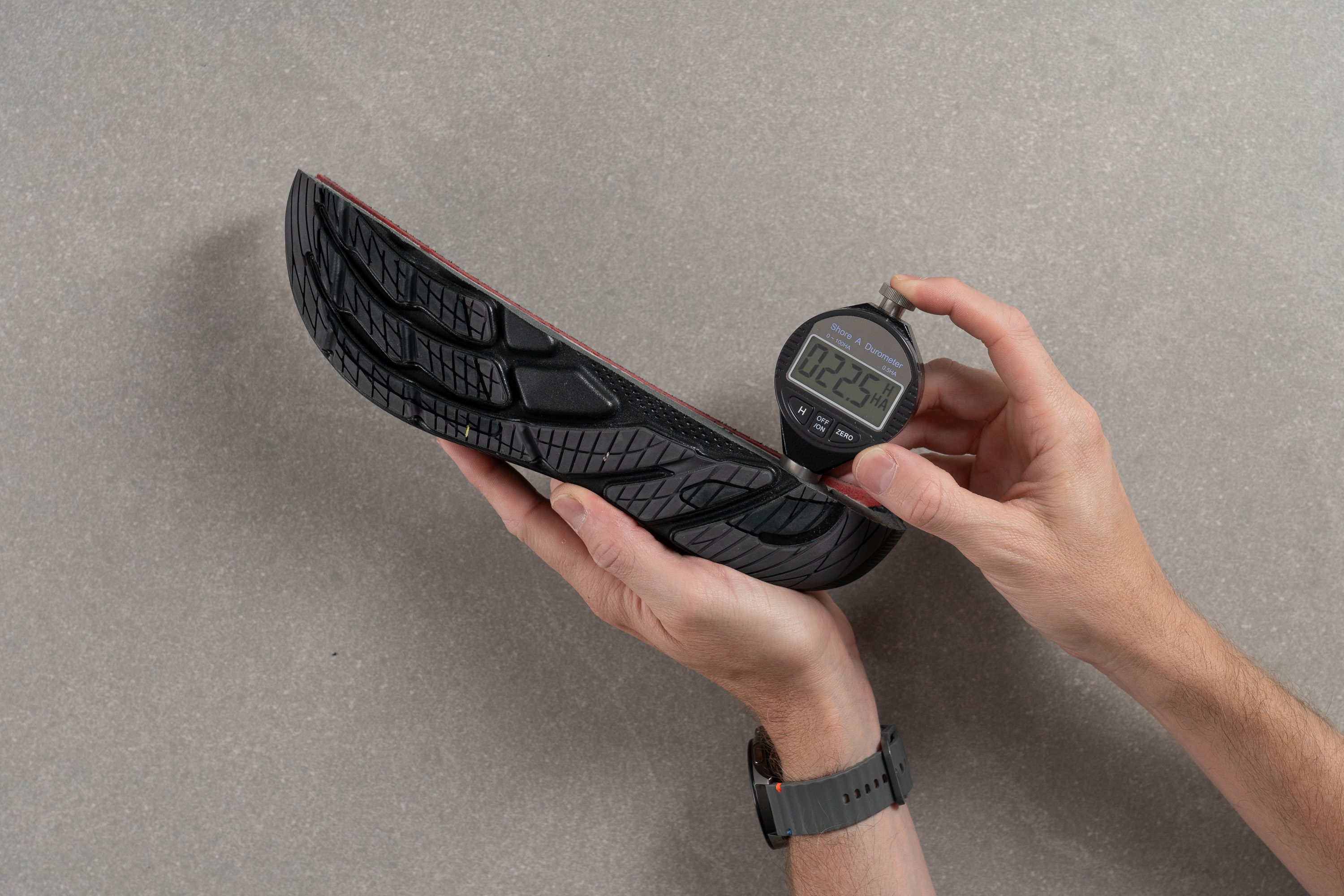
| FWD VIA | 22.5 HA |
| Media | 20.4 HA |
Rocker
El rocker es, sin duda, un diseño poco común en un modelo de Altra. El del antepié parece suave, así que la transición hacia adelante es gradual y las zapatillas no te empujarán de golpe hacia el siguiente paso. Por otro lado, el rocker del talón es bastante más pronunciado de lo que solemos ver en los pares de esta marca.
Esta curvatura más pronunciada en el talón probablemente hará que las transiciones sean más suaves y fluidas, sobre todo para los corredores de mediopié. Este cambio de diseño hace que estas zapatillas se adapten a más tipos de corredores, haciéndolas más accesibles para las distintas técnicas de carrera... aunque también hace que se sientan menos como las míticas Altra con un perfil plano que muchos puristas esperan.
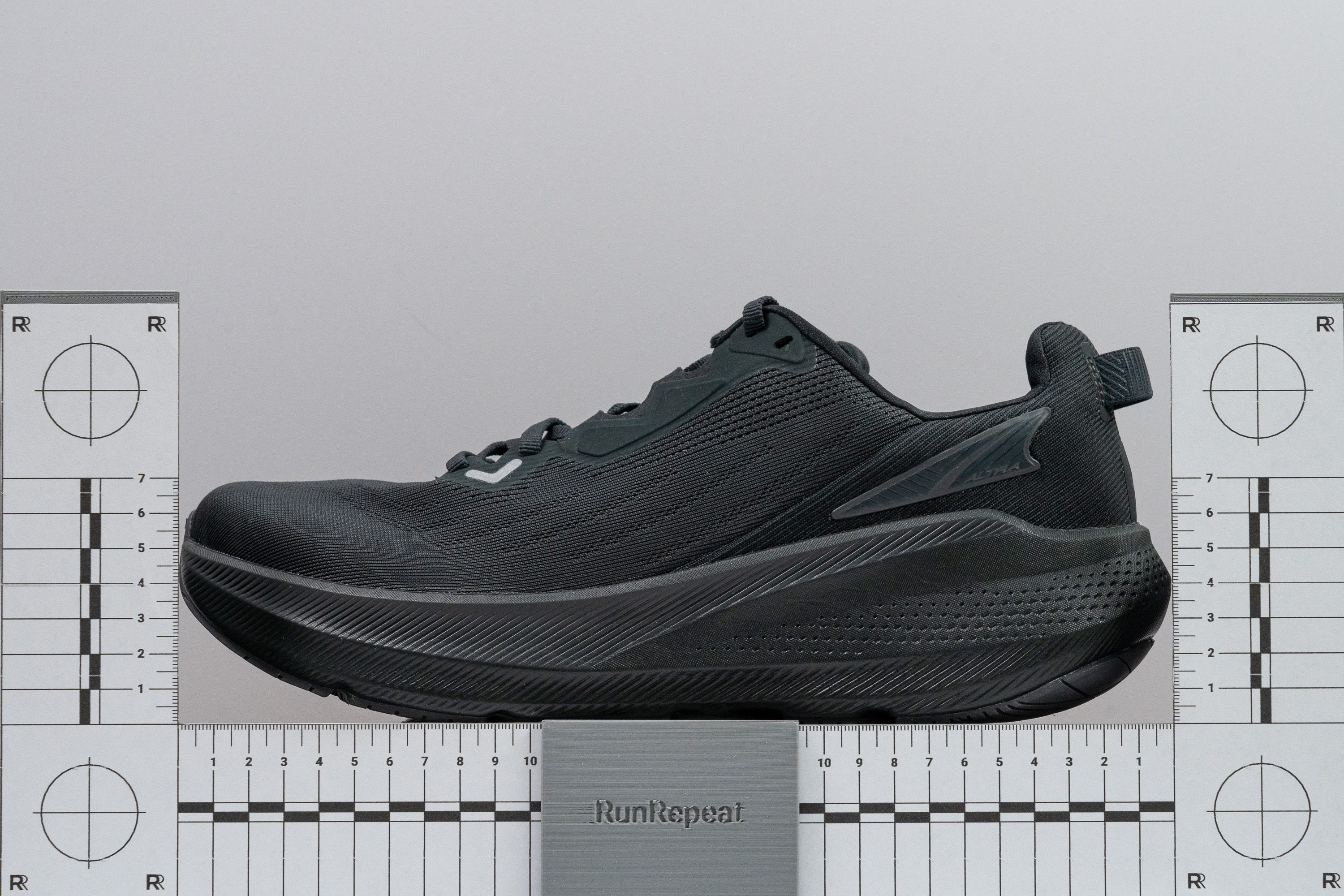
Tallaje y ajuste
Talla
Las Altra FWD VIA quedan un poco pequeñas (25 votos).
Anchura / Ajuste
Aquí es donde las FWD VIA consiguen destacar en comparación con muchas de sus competidoras: gracias a su ajuste FootShape. No nos rendimos ni después de la decepción que nos llevamos con la espuma, así que hicimos un molde de gel de estas zapatillas para verificar si conservan el famoso diseño con una parte delantera espaciosa que vemos en todos los modelos de Altra.
¡Y así fue! Con un resultado impecable de 100,0 mm en su punto más ancho, estas zapatillas son muy espaciosas en la zona del antepié. Su ajuste se centra en la comodidad, y a nuestros pies les quedó claro desde el minuto 1.
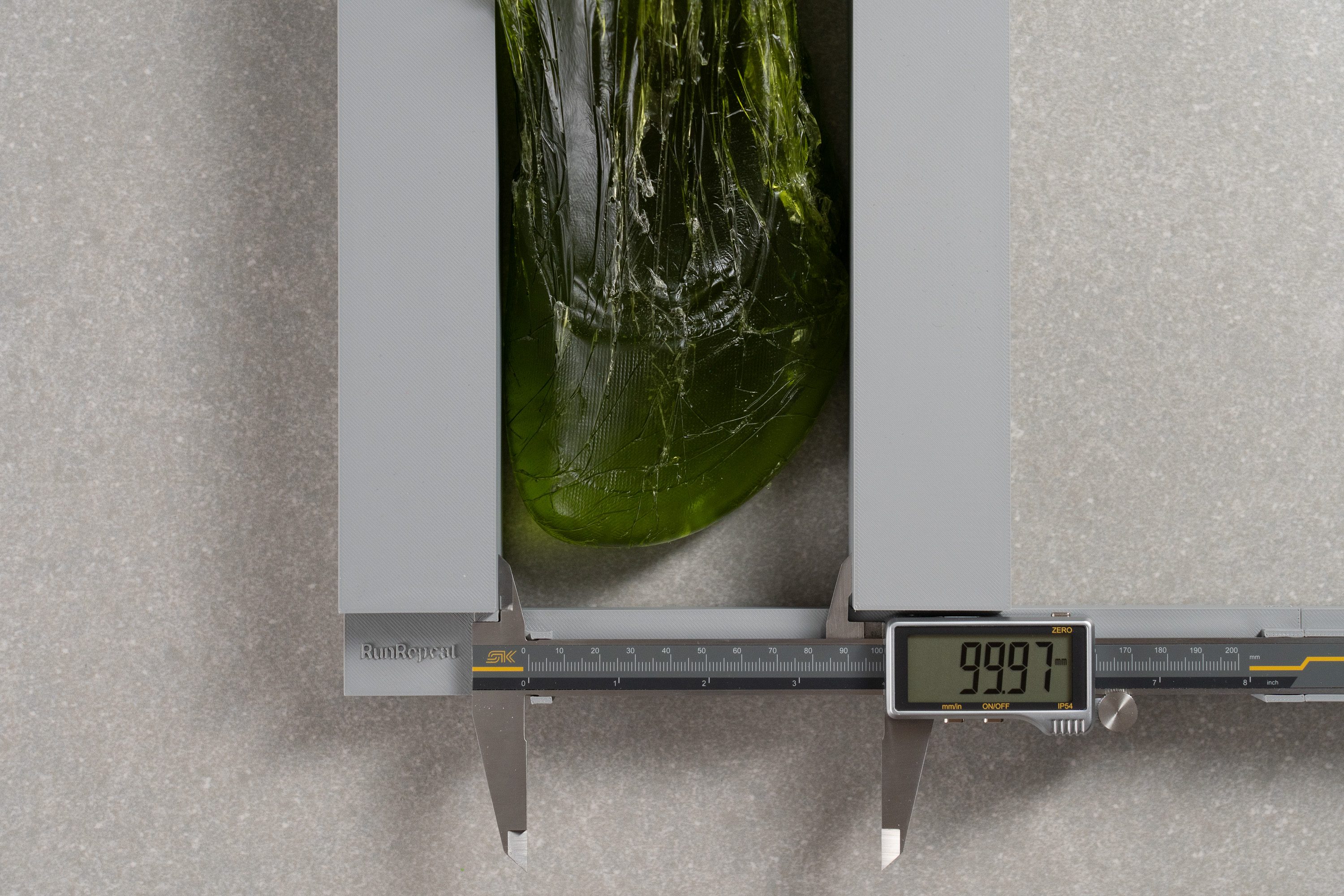
| FWD VIA | 100.0 mm |
| Media | 95.1 mm |
Anchura de la parte delantera
Volvimos a medir la anchura de estas zapatillas, pero esta vez en la zona de los dedos, y la verdad es que nos quedamos encantados.
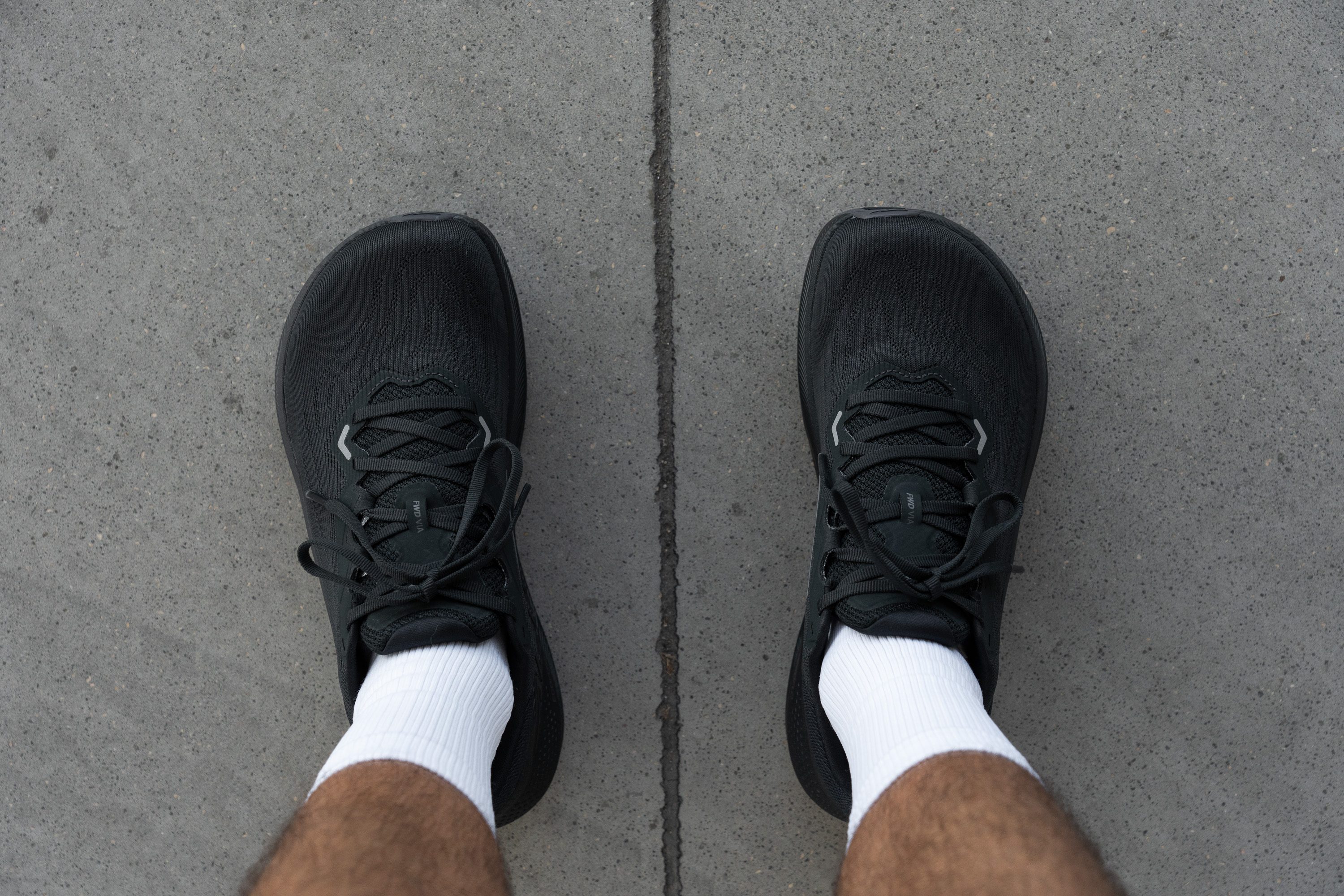
Con 84,5 mm, nos dejaron un montón de espacio para estirar los dedos. Es más, esta medida nos indica que incluso los corredores con pies muy anchos estarán cómodos. Te lo decimos sin ninguna duda: este punto clave es el mayor atractivo de las FWD VIA.
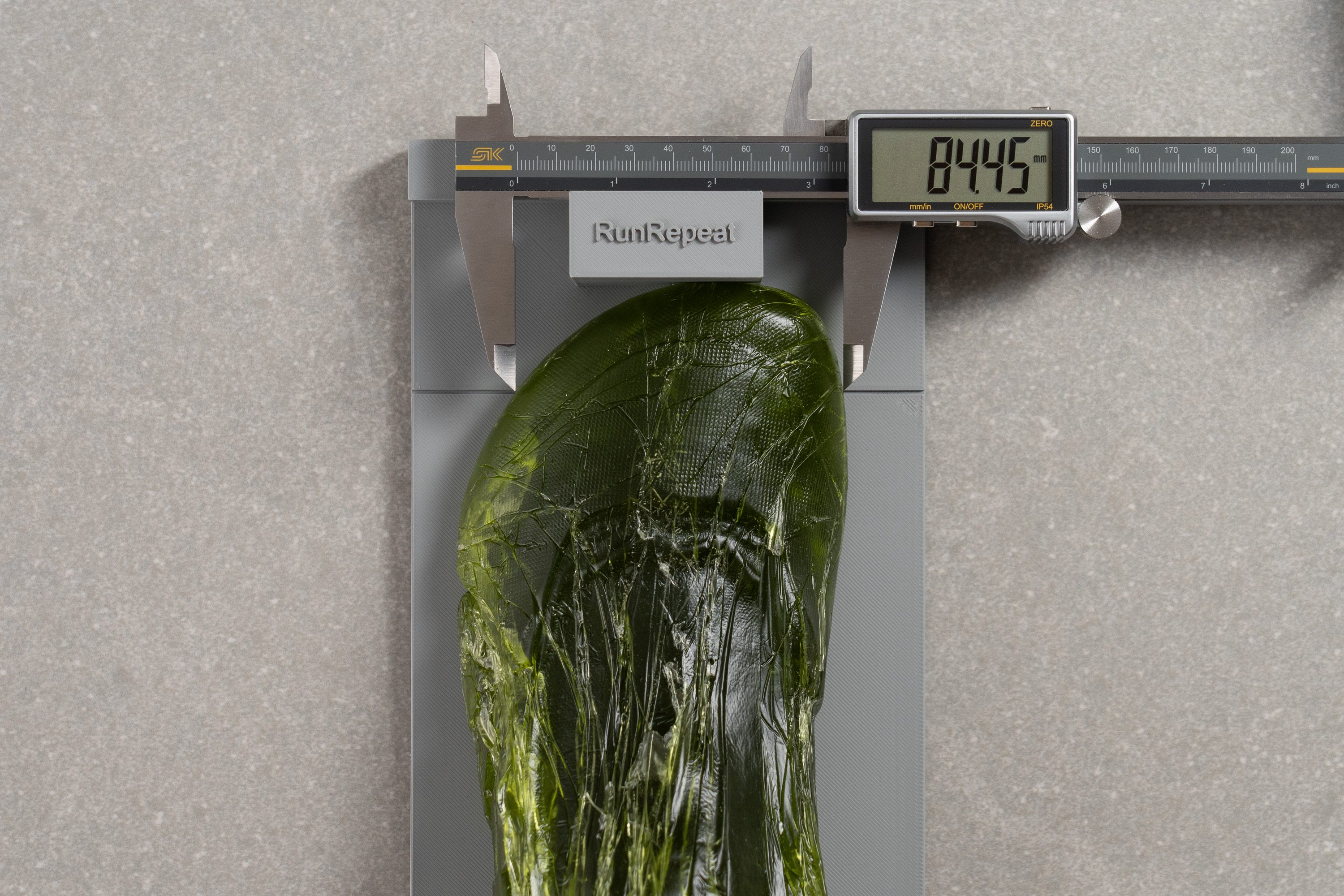
| FWD VIA | 84.5 mm |
| Media | 73.3 mm |
Altura de la parte delantera
La altura de la parte delantera alcanza 29,1 mm, así que esta zona también es muy espaciosa verticalmente hablando. A los corredores con pies de gran volumen les va a encantar, ya que garantiza una libertad de movimiento total, ¡sin restricciones!
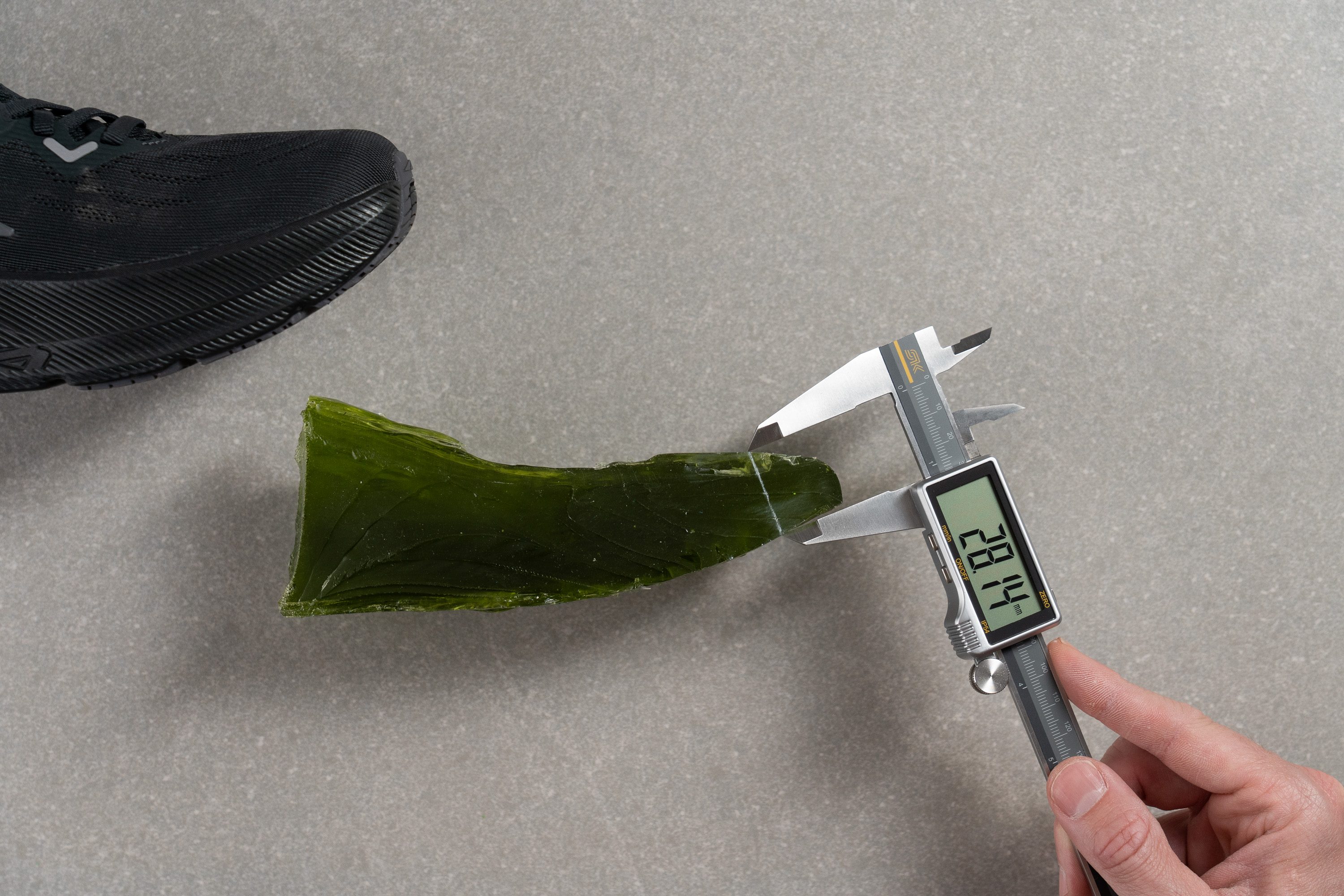
| FWD VIA | 29.1 mm |
| Media | 27.0 mm |
Tracción / Agarre
Traction test
Analizamos las FWD VIA con nuestra máquina de tracción personalizada para evaluar el agarre sobre mojado y se llevaron un 0,48. Esto nos dice que su agarre es excelente en superficies secas, y confiable incluso cuando el día se pone feo.
| FWD VIA | 0.48 |
| Media | 0.49 |
Diseño de la suela exterior
La suela exterior de las FWD VIA está compuesta por varios segmentos de caucho resistente que ofrecen una cobertura excelente. Los tacos del antepié tienen cortes diagonales con una mezcla de formas rectangulares y trapezoidales, mientras que las del talón tienen un diseño más afilado y anguloso.
Puedes ver la espuma EVA expuesta en la zona del mediopié, enmarcada por cápsulas de caucho que mejoran la estructura y con el logo de Altra grabado. Como ocurre con todos los modelos de esta marca, la suela está segmentada para imitar cómo están colocados los huesos de los pies de las personas.
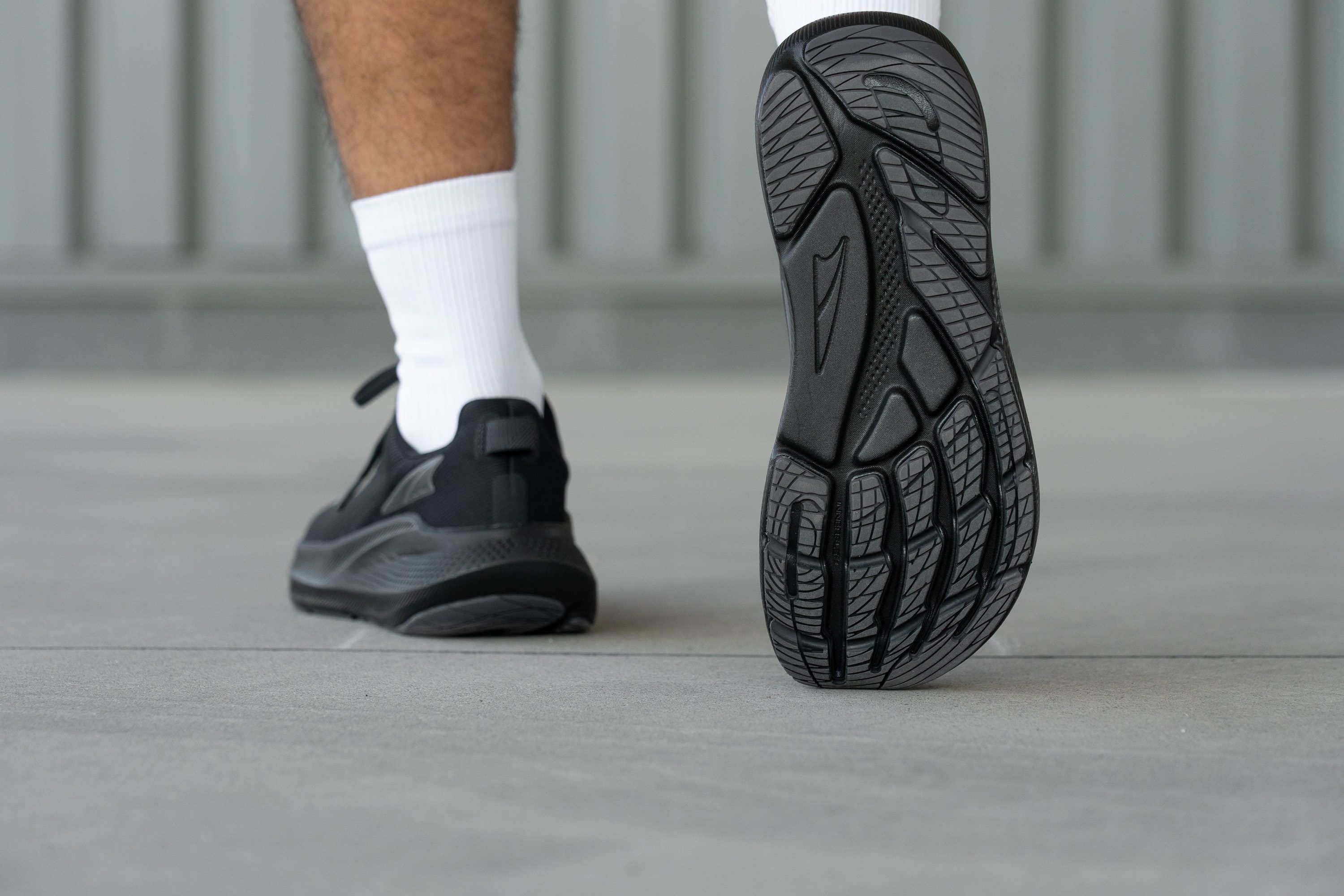
Flexibilidad / Rigidez
Hace un tiempo, Altra era sinónimo de flexibilidad y de una pisada natural, pero la marca decidió dejar esa reputación atrás. Las FWD VIA necesitaron 14,5 N de fuerza en nuestra prueba de 30 grados, mostrando una rigidez moderada y una flexibilidad limitada.
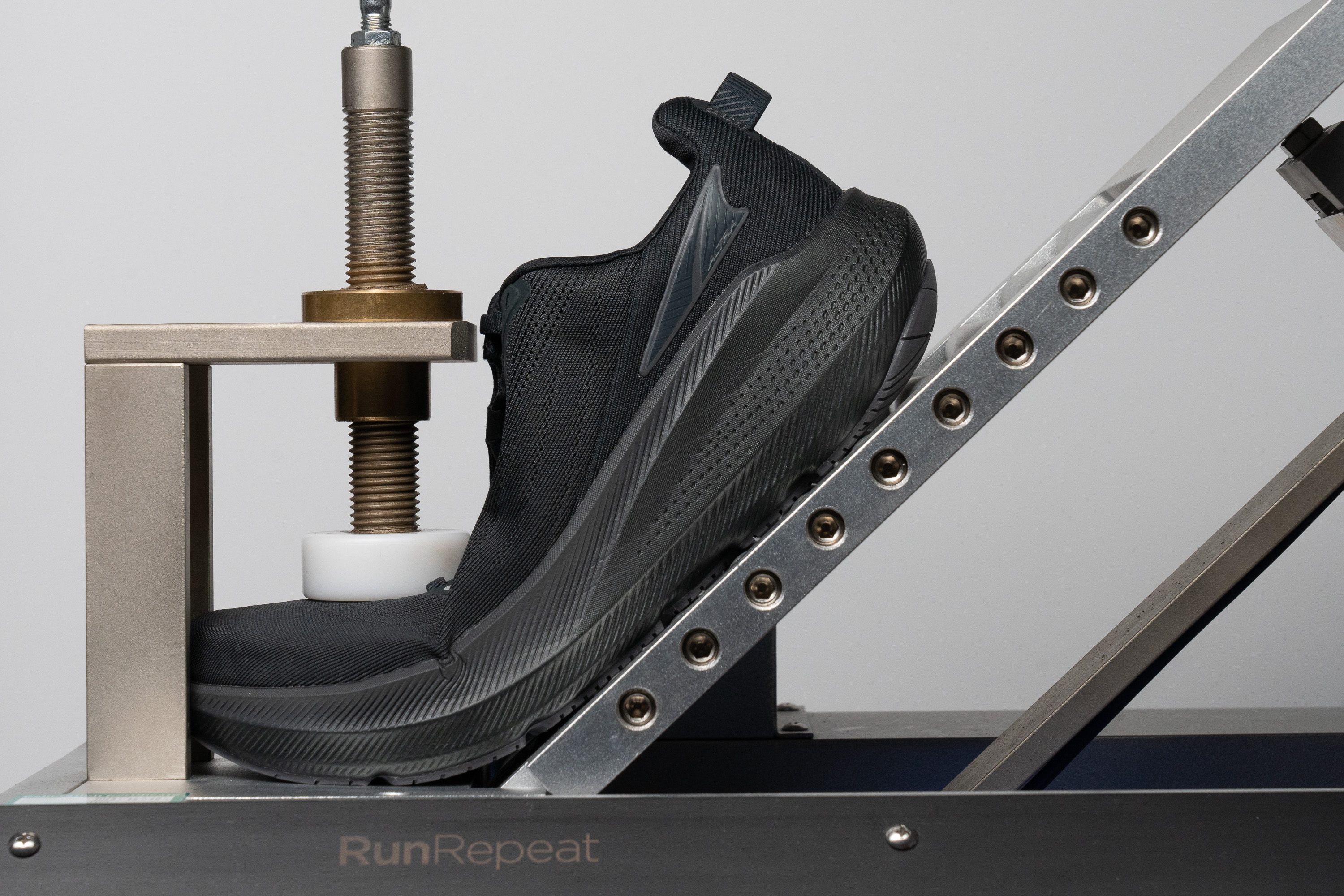
| FWD VIA | 14.5N |
| Media | 15.3N |
Peso
Otra característica destacable de las FWD VIA es que pesan poco. Nos pareció impresionante que nuestra báscula marcase solo 255 g, hasta nos frotamos los ojos por si estábamos viendo mal. Esto hace que se sientan más ágiles en los pies.
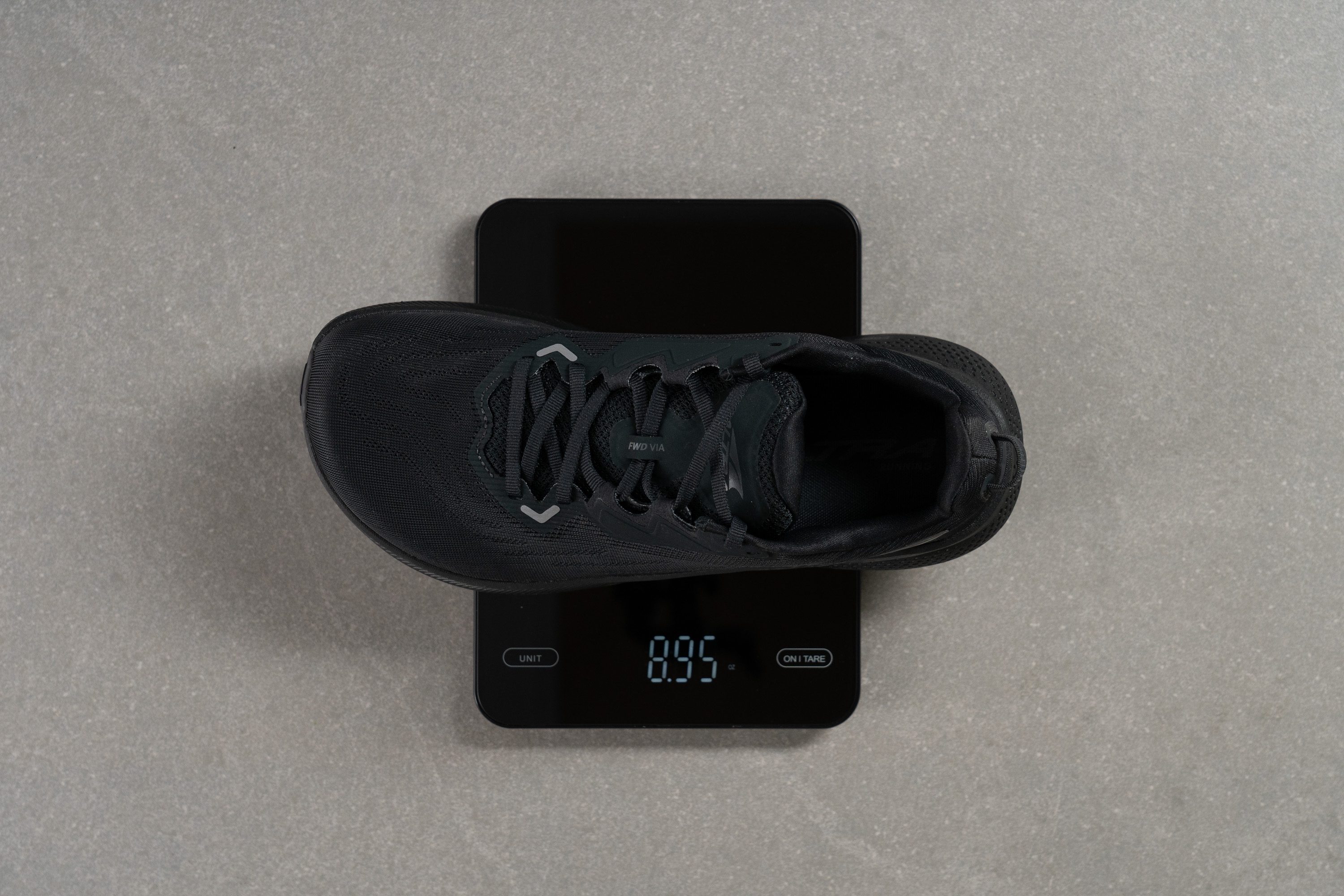
| FWD VIA | 9.0 oz (254g) |
| Media | 9.3 oz (264g) |
Transpirabilidad
La versión completamente negra que compramos (la única disponible en una talla 9 estadounidense de hombre en ese momento) no parece transpirable, pero bueno, es algo bastante normal para los modelos de tonos oscuros. Para comprobarlo, conectamos nuestra máquina a las zapatillas con una pieza hecha por nosotros mismos e impresa en 3D y esperamos a que saliera el humo.
Aunque no tienen el mejor flujo de aire del mundo, el rendimiento de las FWD VIA nos pareció aceptable, así que les dimos un 3/5. Si a esto le sumamos el color en el que nos las cogimos, probablemente no sean la mejor opción cuando hace calor o si te está dando el sol de manera directa en los pies; pero en otros colores o cuando hace más fresquito, esto no debería ser un problema importante.
También descubrimos que el upper utiliza una malla técnica con densidad variable que permite que la luz pase con mayor facilidad a través de ciertas zonas.
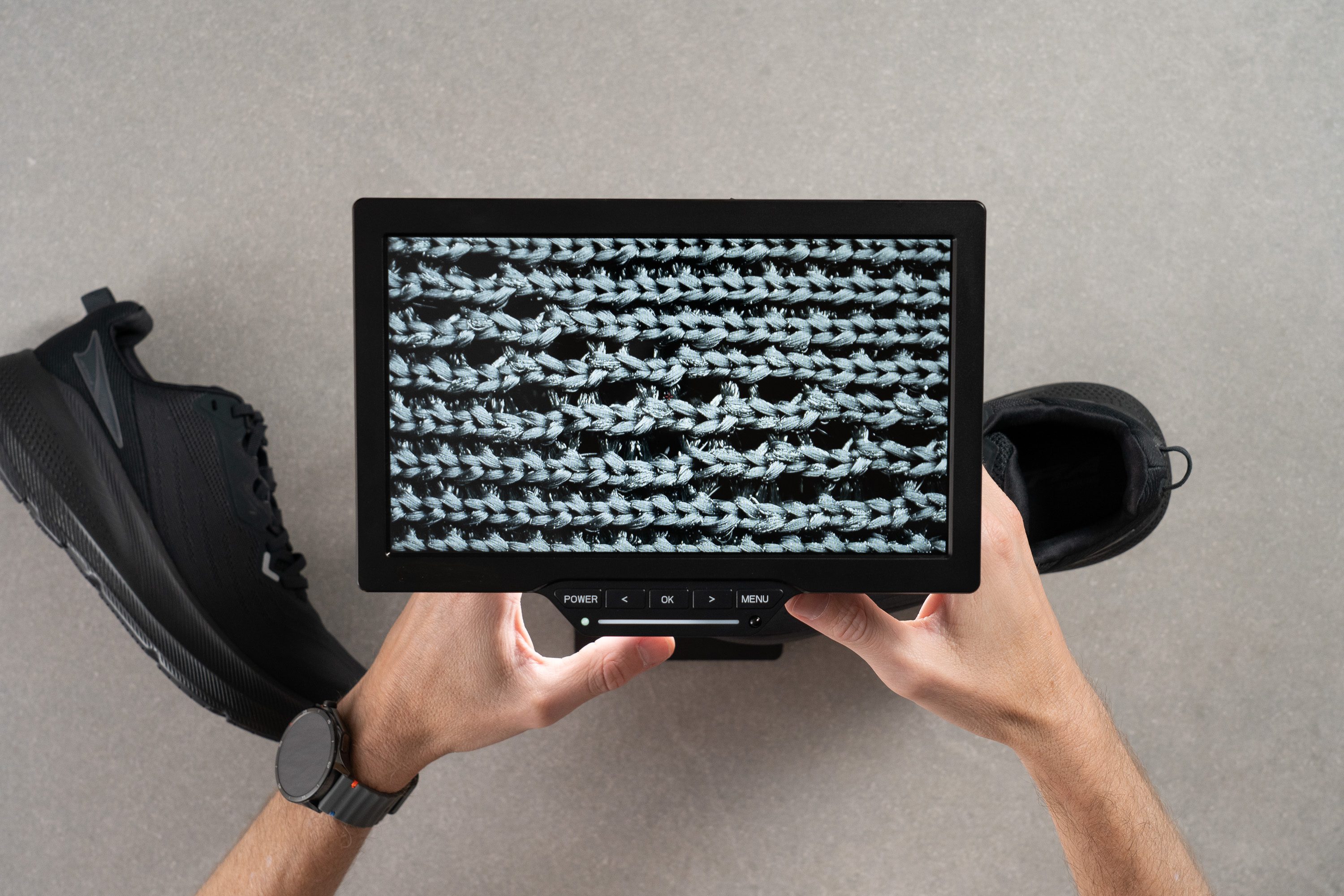
Gracias a nuestro microscopio, pudimos confirmar esta variación en la densidad. Creemos que es clave para evitar un mal resultado en nuestra prueba de transpirabilidad.
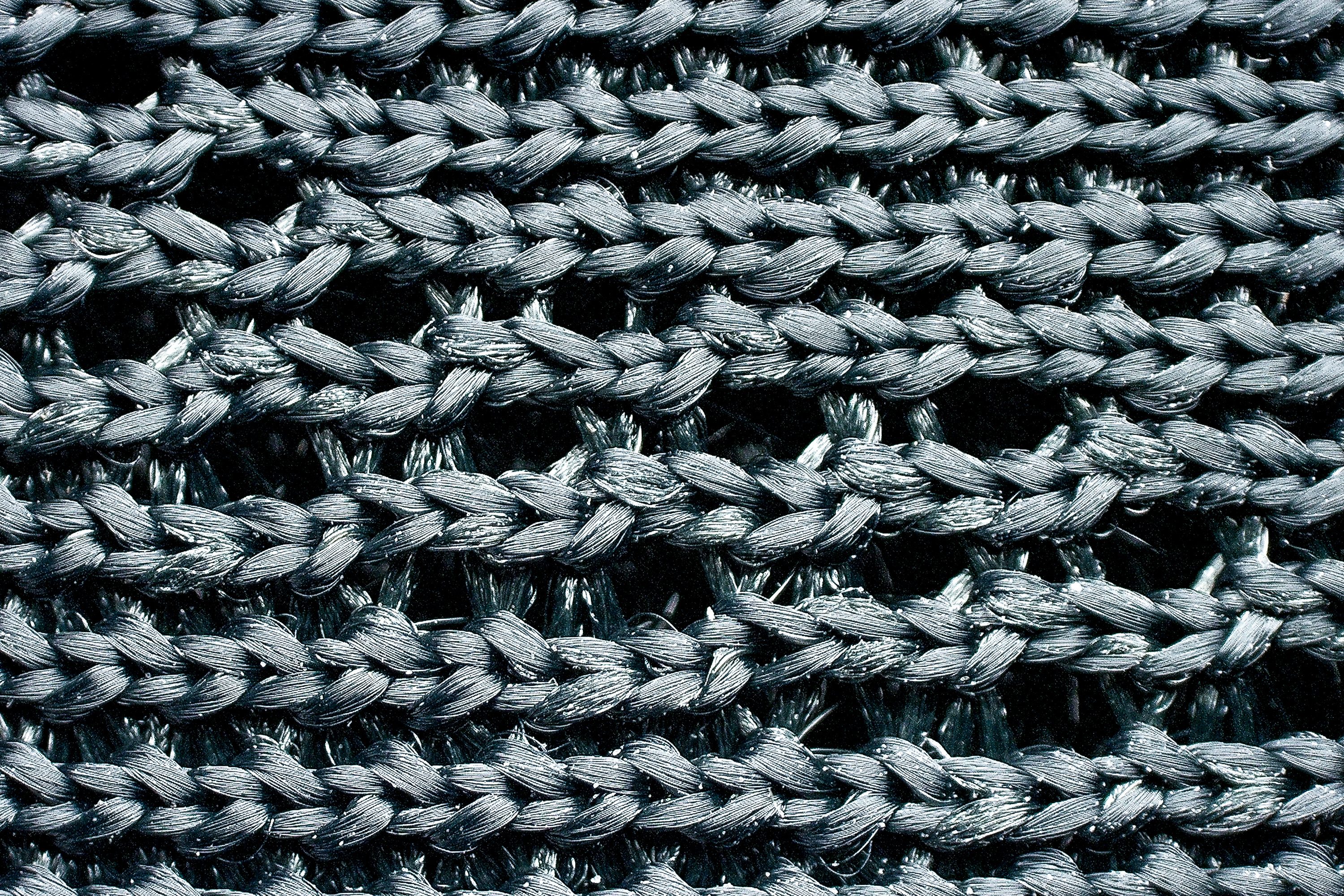
El upper está muy acolchado y, claramente, diseñado para ofrecer comodidad, que es algo que también te va como anillo al dedo si te quieres poner estas zapatillas de forma casual.
| FWD VIA | 3 |
| Media | 3.7 |
Estabilidad
Prueba de estabilidad lateral
Aunque pertenecen a la línea neutra de Altra, las FWD VIA se pueden adaptar a los corredores que necesitan una estabilidad moderada. Su estructura ancha, la sujeción de las paredes laterales y su diseño rígido te ayudan a controlar los movimientos laterales y a mantener el pie en su sitio.
Rigidez torsional
Las FWD VIA te ofrecen una pizquita de flexibilidad lateral, y la verdad es que lo agradecemos. Incluso así, les dimos un 4/5 en nuestra prueba de rigidez torsional, y creemos que la gente que lleva siendo fan de Altra muchos años a lo mejor piensa que son un poco toscas.
| FWD VIA | 4 |
| Media | 3.5 |
Rigidez del contrafuerte del talón
El contrafuerte del talón obtuvo una puntuación equilibrada: un 3/5, pero destacó por su comodidad gracias a la generosa cantidad de espuma que Altra le puso. Esto creó una amortiguación suave que envuelve delicadamente el talón.
| FWD VIA | 3 |
| Media | 2.9 |
Anchura de la mediasuela - antepié
Las FWD VIA te llaman la atención a nivel visual desde el minuto uno, así que teníamos muchas ganas de empezar a medirlas.
En la parte delantera, superaron la media sin problemas con sus 118,0 mm, aunque se mantuvieron por debajo de los 120 mm que muchos modelos maximalistas modernos alcanzan hoy en día.
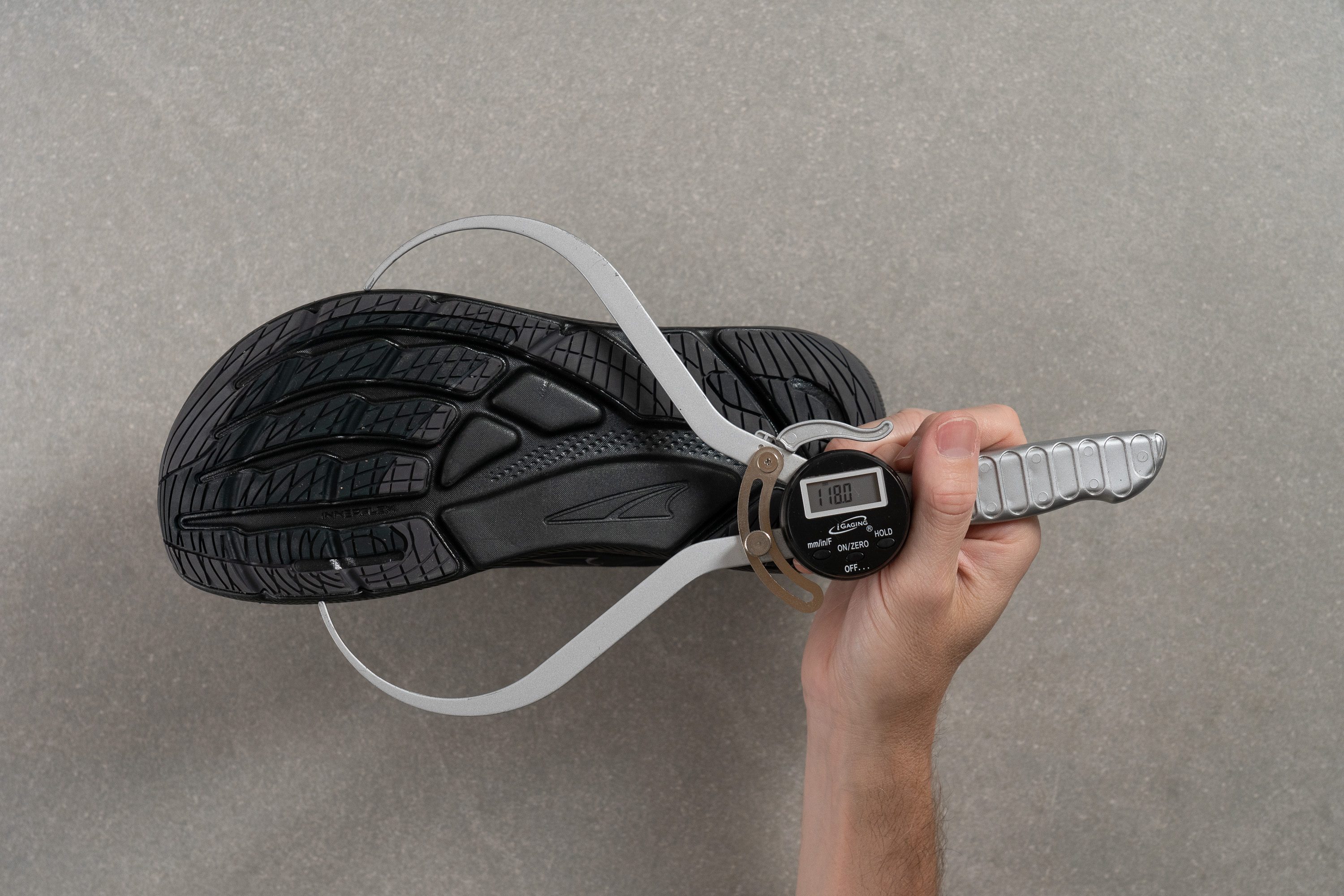
| FWD VIA | 118.0 mm |
| Media | 114.4 mm |
Anchura de la mediasuela - talón
Con 95,9 mm, el talón es bastante más ancho que el de un modelo de entrenamiento diario promedio. Si a esto le sumamos lo ancha que es la zona del mediopié, estas zapatillas terminan con un perfil cuadrado, que es un tipo de diseño que hace que se sientan más estables.
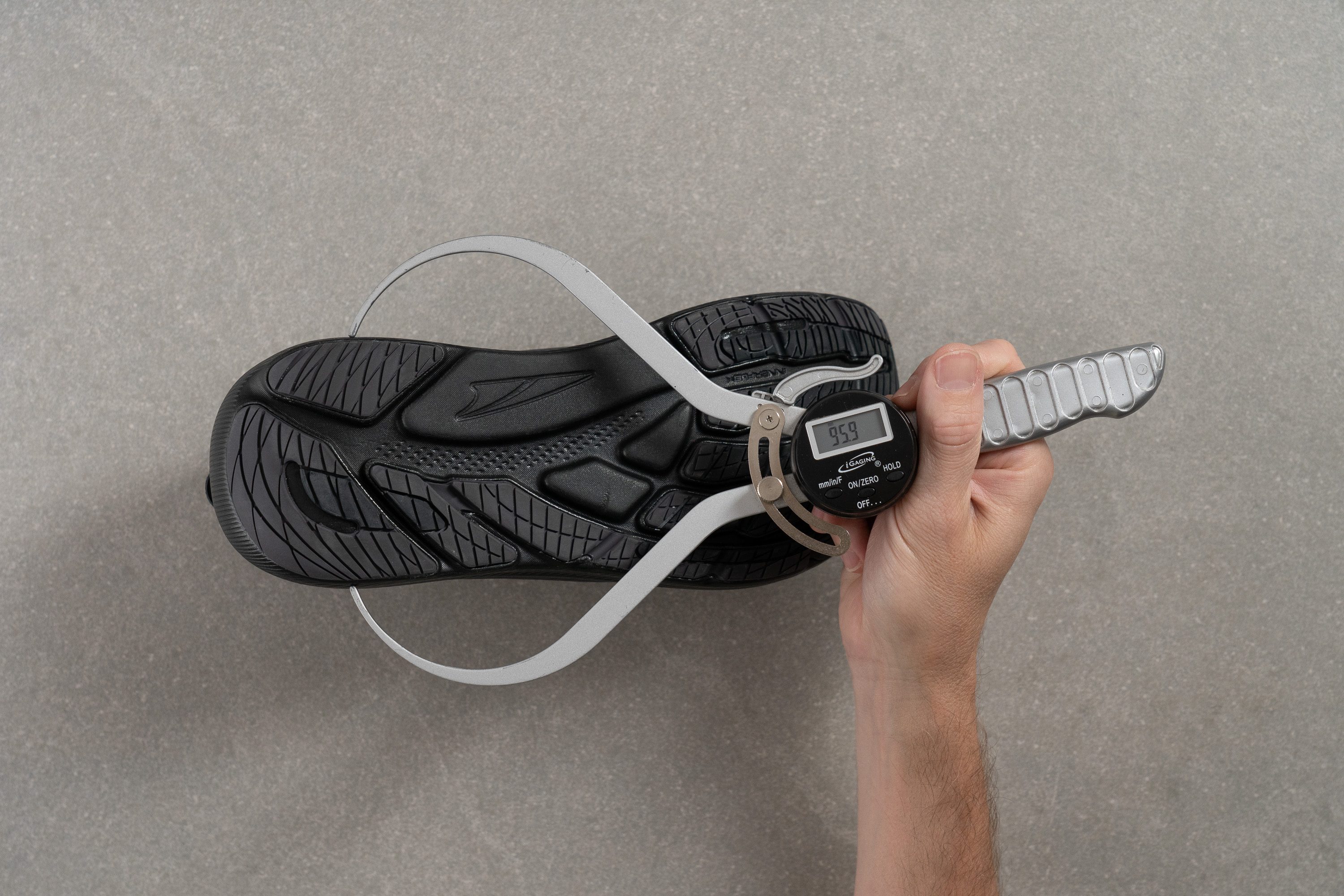
| FWD VIA | 95.9 mm |
| Media | 90.6 mm |
Durabilidad
Durabilidad de la parte delantera
Las FWD VIA se llevaron un sólido 3/5 en nuestra prueba de durabilidad de la parte delantera. No es una locura, pero sí lo suficientemente bueno como para que no te tengas que preocupar por el desgaste prematuro en esta zona.
| FWD VIA | 3 |
| Media | 2.6 |
Durabilidad del acolchado del talón
El acolchado del talón obtuvo solo un 2/5 en nuestra prueba Dremel, así que hacemos un llamamiento a los corredores que suelen desgastar las zapatillas en esta zona... para que se anden con ojo. Incluso si no eres uno de ellos, sigue siendo una información útil a tener en cuenta.
| FWD VIA | 2 |
| Media | 3.4 |
Durabilidad de la suela
La durabilidad no parece ser uno de los principales puntos fuertes de las FWD VIA, y la verdad es que es algo que nos cogió por sorpresa. Con unos daños de 1,6 mm de profundidad después de nuestra prueba Dremel, creemos que necesitan un compuesto más resistente para que su vida útil sea más larga.
| FWD VIA | 1.6 mm |
| Media | 1.1 mm |
Grosor de la suela
A ver, no es que su caucho sea muy duradero, así que Altra decidió que su grosor fuese de 3,1 mm. Esto debería ser suficiente para que tenga una vida útil razonable, aunque el resultado anterior... no es muy alentador, no te vamos a engañar.
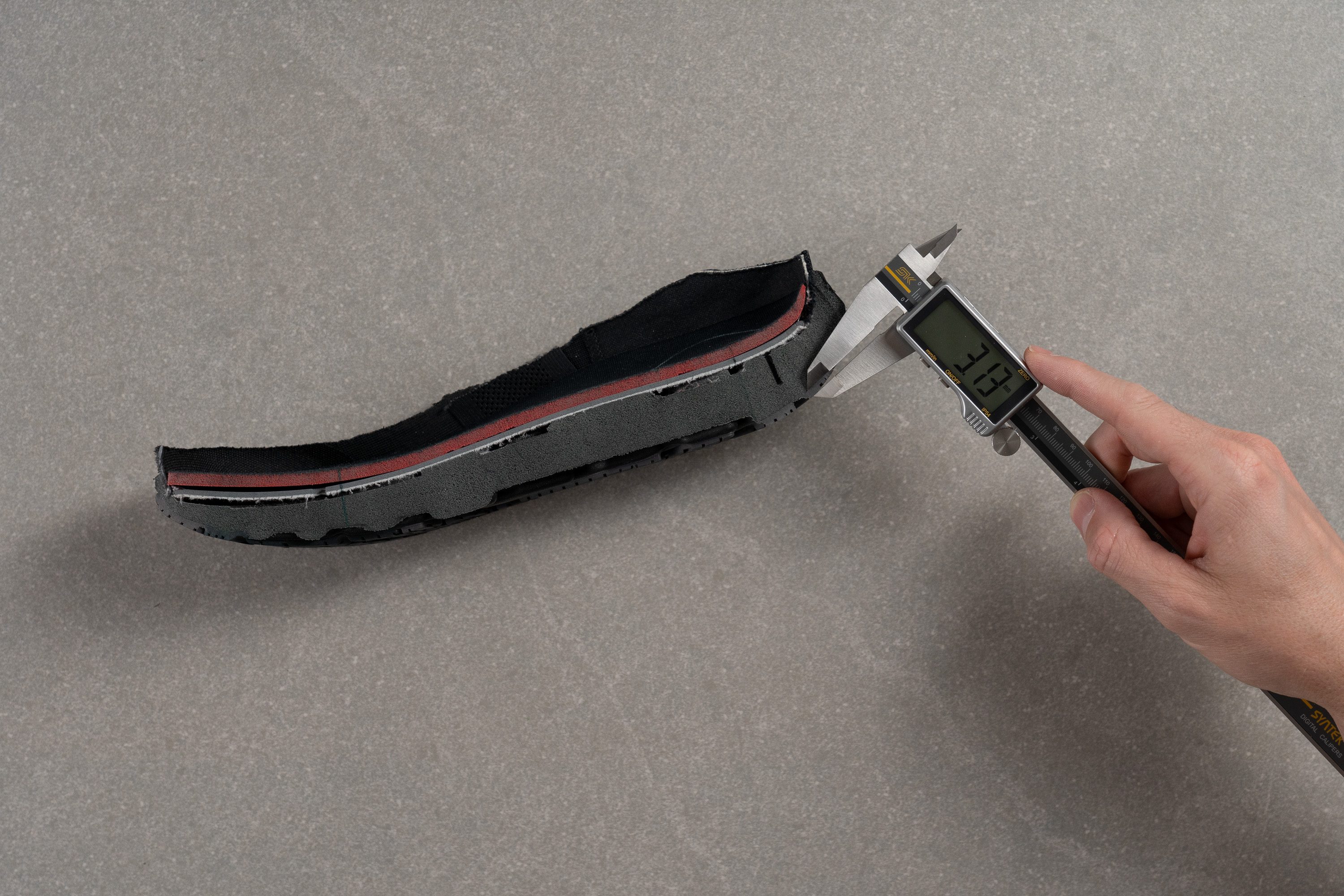
| FWD VIA | 3.1 mm |
| Media | 3.2 mm |
Varios
Grosor de la plantilla
La plantilla tiene 5,0 mm de grosor, que es un resultado muy cercano a la media de los modelos diseñados para correr a diario y para un uso casual.
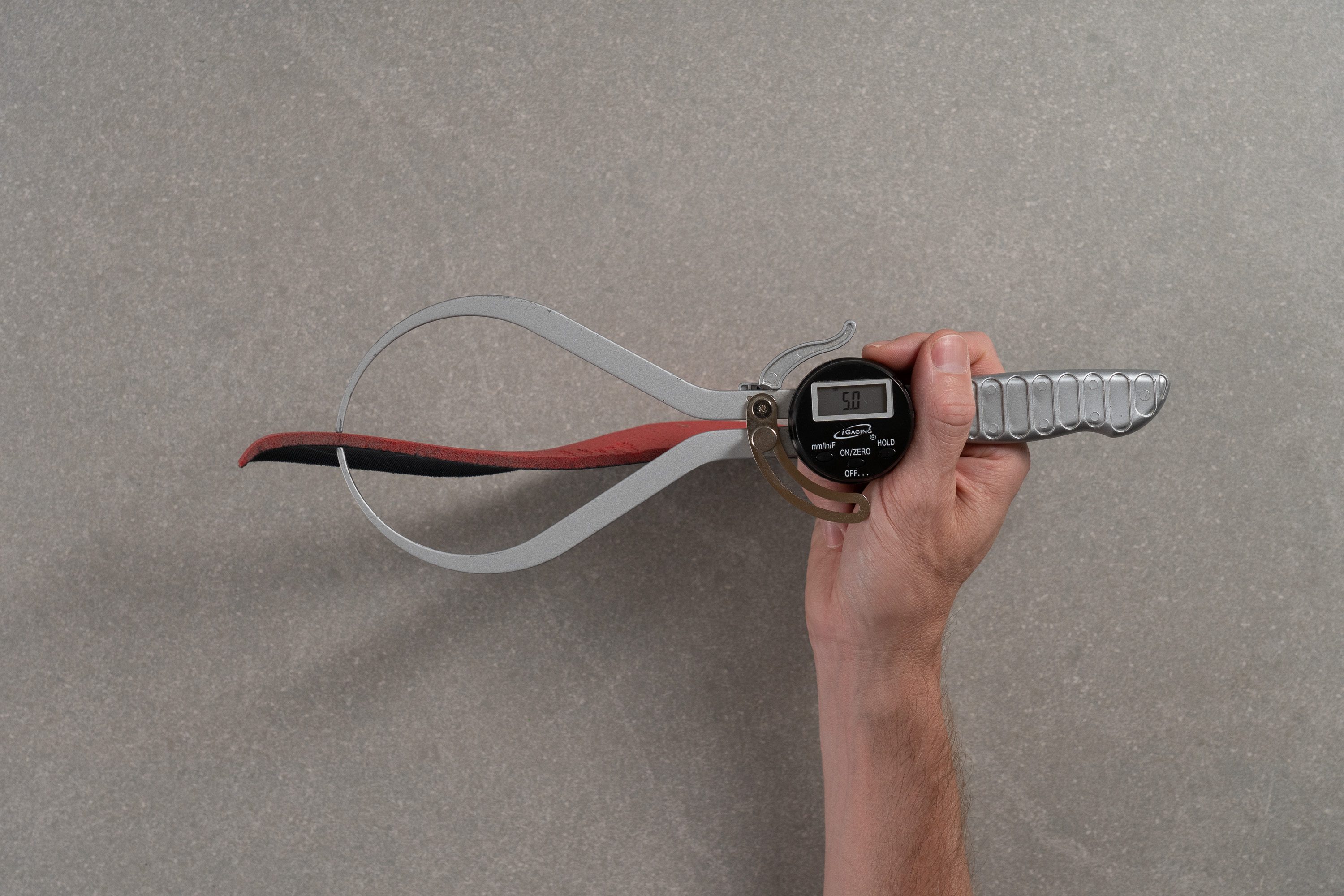
| FWD VIA | 5.0 mm |
| Media | 4.5 mm |
Plantilla extraíble
Puedes quitarles la plantilla original que te da Altra, aunque no será fácil encontrar un reemplazo que sea tan amplio en la zona de los dedos.
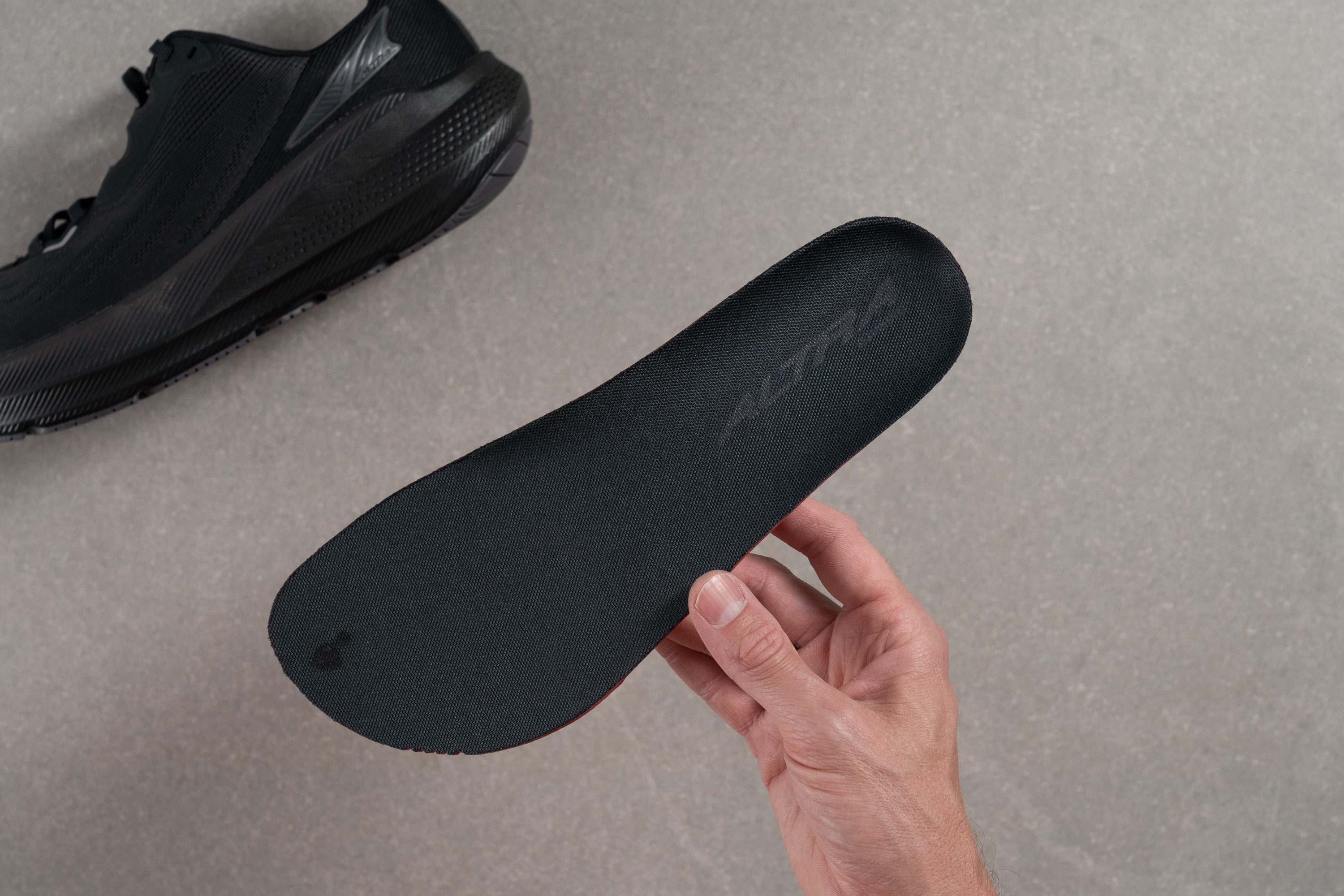
| FWD VIA | Sí |
Rigidez de la mediasuela en frío (%)
La espuma EGO FLO sigue siendo EVA, así que no nos esperábamos un rendimiento excepcional cuando bajan las temperaturas. Tal como nos imaginábamos, se volvió un 30 % más rígida después de estar solo 20 minutos en nuestro congelador.
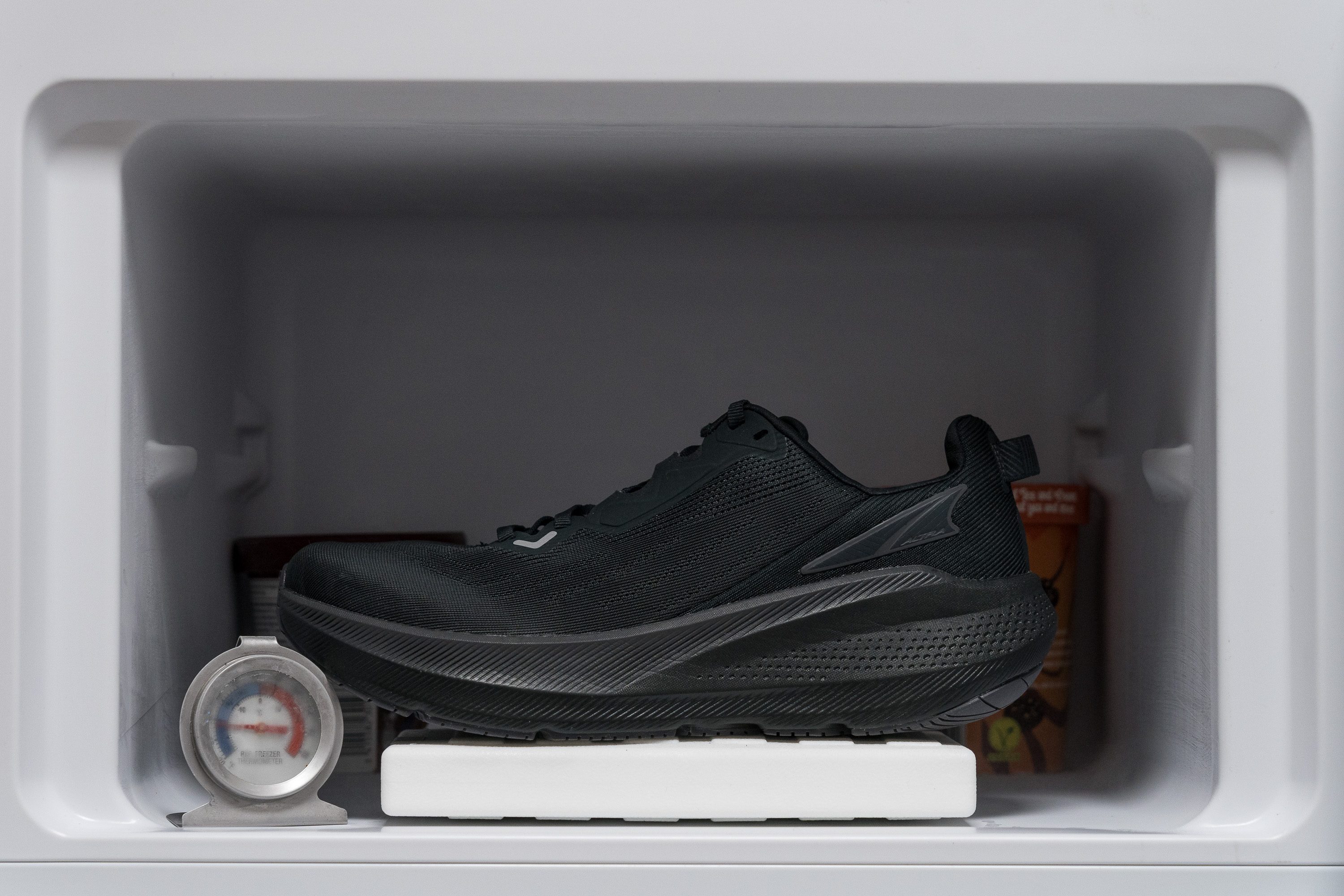
| FWD VIA | 30% |
| Media | 24% |
Elementos reflectantes
Siempre agradecemos que las zapatillas de running tengan elementos reflectantes, y las FWD VIA nos alegraron el día. Eso sí, podrían haber sido un poco más grandes para ofrecer una mejor visibilidad... pero no nos vamos a quejar.
| FWD VIA | Sí |
Acolchado de la lengüeta
Está claro que Altra diseñó este modelo pensando en algo más que en correr, ya que muy probablemente espera que mucha gente se lo ponga también para su día a día. Los 9,0 mm de acolchado de su lengüeta lo hacen muy cómodo, y eso nos encanta.
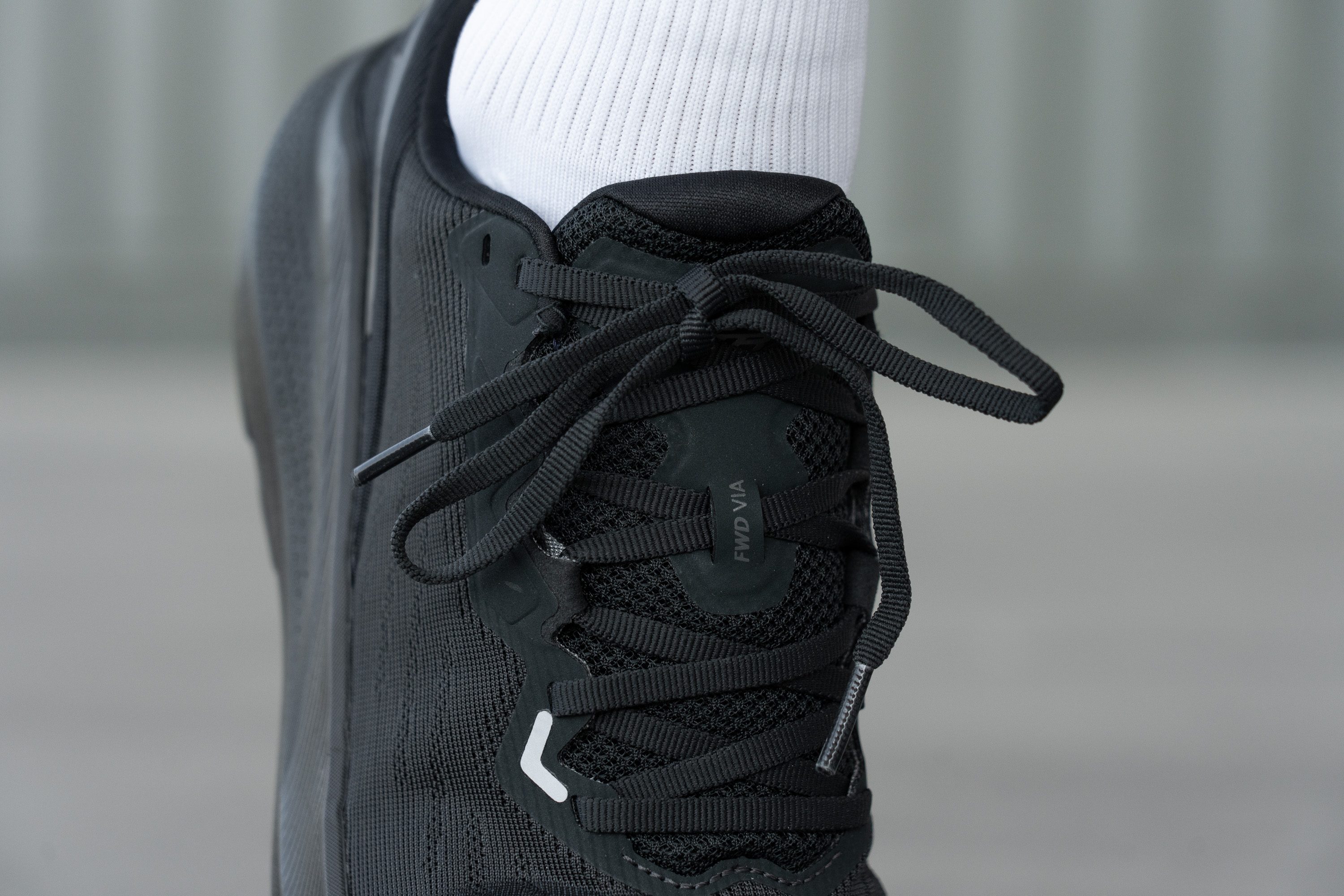
Su sistema de cordones es un poquito raro, combinando ojales perforados en la parte inferior con lacitos a modo de ojal en la superior, ya que esto hace que los cordones se muevan de forma más fluida y que el ajuste sea más adaptable. También descubrimos un ojal reforzado en la parte de arriba que se encarga de que la lengüeta no se mueva del sitio.
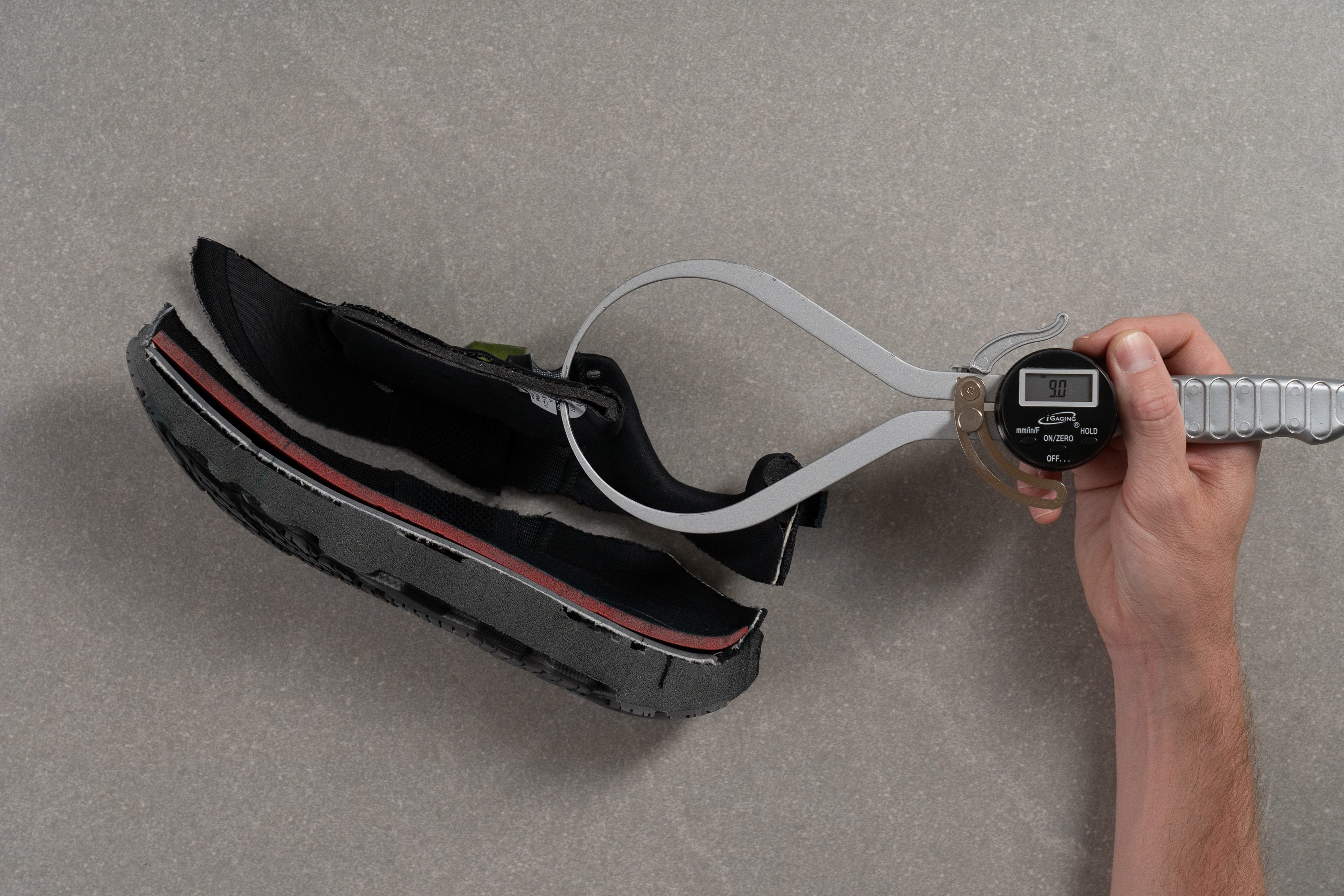
| FWD VIA | 9.0 mm |
| Media | 5.7 mm |
Lengüeta: tipo de refuerzo
La lengüeta está semirreforzada y sujeta a la mediasuela, cosa que nos parece ideal para evitar que te esté bailando de un lado a otro (que es un problema común entre las zapatillas con partes delanteras amplias).
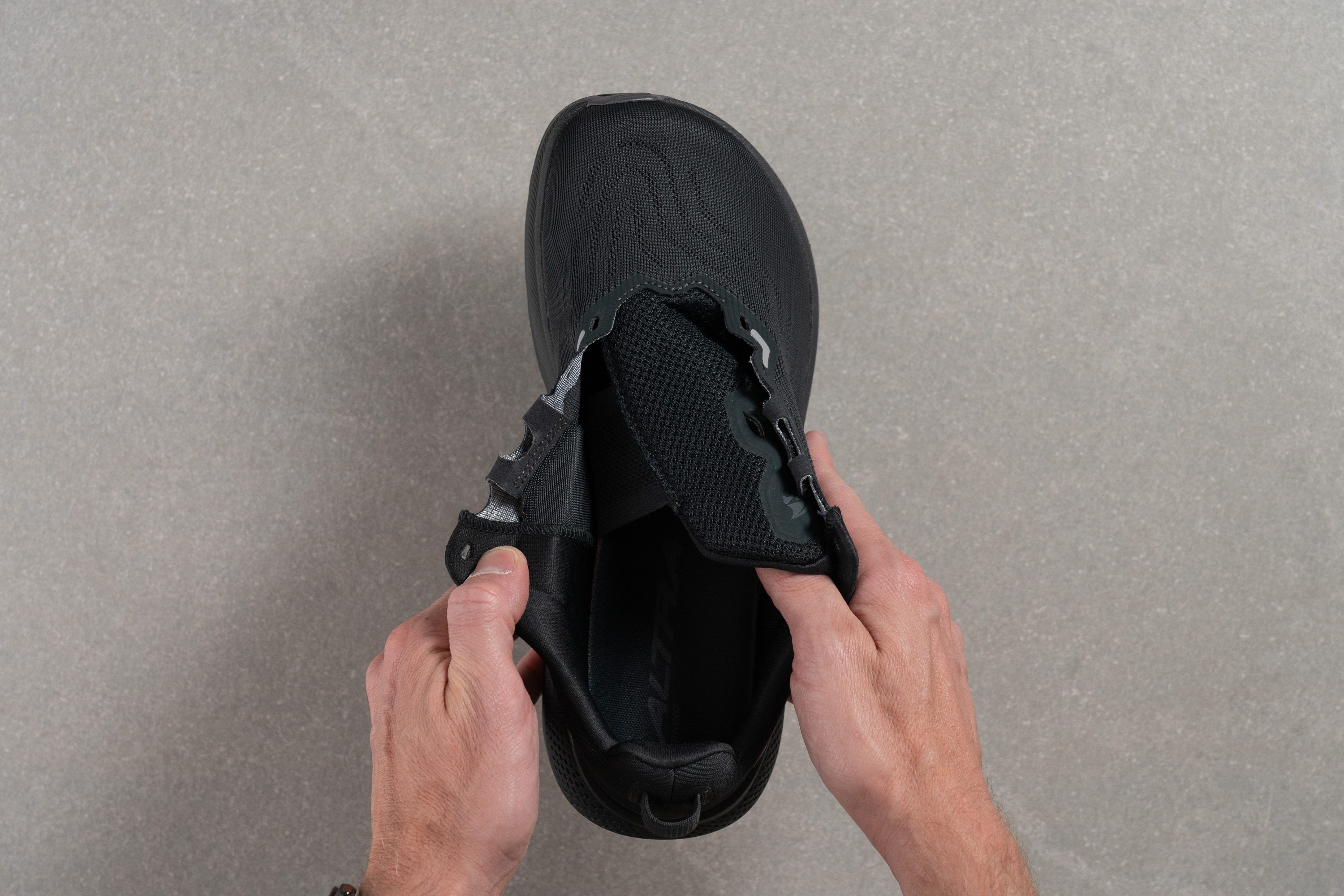
| FWD VIA | Ambos lados (semi) |
Precio
Teniendo en cuenta lo competitiva que es actualmente la categoría de zapatillas de entrenamiento diario, no podemos decir que el precio de las FWD VIA sea uno de sus principales puntos fuertes. Lo que sí que es cierto, es que a los corredores que buscan una parte delantera espaciosa les parecerán tan cómodas que seguro que piensan que son una buena inversión.
| FWD VIA | $160 |
Tirador del talón
El talón tiene un tirador horizontal que está firmemente cosido al upper, además de que está reforzado para que no se te rompa antes de lo que debería.
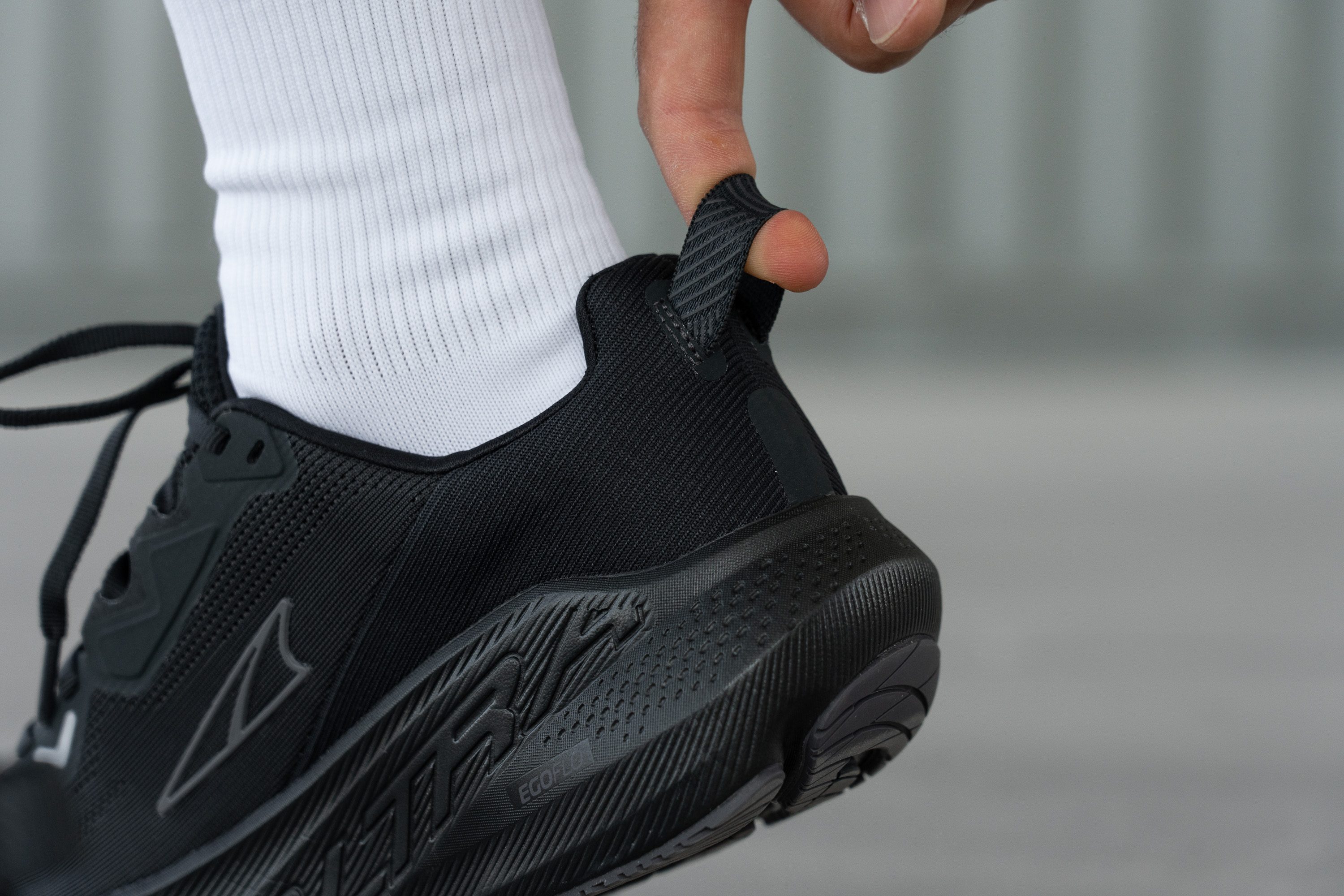
| FWD VIA | Tirador circular |

